KEO News Wire
Pollard’s power play a Bok play-off statement
Handre Pollard must start South Africa’s quarter-final in a fortnight. Manie Libbok must be in the 23-strong match-day squad, writes Mark Keohane.
Handre Pollard must start South Africa’s quarter-final in a fortnight. Manie Libbok must be in the 23-strong match-day squad, writes Mark Keohane.
Cometh the hour and cometh the man: Pollard, who had not played a Test in 13 months and had played just 31 minutes of rugby in the past four months, started at No 10 against Tonga. He was an example of calm, power and delivery in everything he did.
He is a general and commanded the Boks play in a very challenging opening 50 minutes. He kicked four conversions from four attempts, the first two, from the corner and on his wrong side, being right footed. The ball was sailing through with 25 seconds still left on World Rugby’s conversion clock watch.
Pollard’s past few years have been ravaged by injury. It is very similar to Dan Carter’s game time and international form between the 2011 and 2015 World Cup. Most of New Zealand’s rugby public wanted Carter axed for the 2015 World Cup. It was believed younger players were fitter, better and had played more international rugby.
Lima Sopoaga was picked ahead of Carter to play the Springboks at Ellis Park. Carter was left in New Zealand to prepare for the Wallabies a week later. The All Blacks beat the Boks and Sopoaga was very good. The lay person wanted him to go to the World Cup at Carter’s expense.
Out of sight was out of mind for Carter, but the greatest No 10 in New Zealand’s history, delivered a commanding performance against Australia and the All Blacks coaching staff trusted instinct, class, pedigree and the experience of Carter having played in three World Cups.
The rest is history. Carter was sublime in the 20-18 semi-final win against the Springboks and even better in the title-winning final against Australia.
Pollard brings a similar presence to the Boks that Carter did for the All Blacks.
This is not about Pollard versus Libbok but about what dynamic is best suited to a winning play-off.
I believe both players, so different in every aspect of flyhalf play, can make a contribution to a winning result over 80 minutes.
I also believe Pollard starting is a stronger influence than Pollard playing the final 20 or 30. Equally, Libbok will bring a creative and attacking ‘ball in hand’ presence that Pollard can’t match. But this Libbok blitz would have more potency running against some fatigued minds and tired legs.
Libbok, introduced to change a game or close out a game, gives me more comfort than the pressure of him starting a play-off game and being judged by his first attempt at posts.
Pollard’s kicking success, from the first attempt against Tonga, provided such certainty and Libbok added to that in slotting three from three.
Libbok’s natural game means more attacking metres, but more attacking metres doesn’t automatically translate into victory. Pollard’s game is more conservative, forces the Boks to go to their forward set piece early and then build scoreboard pressure through penalties and the successful conversion of these opportunities.
Libbok’s natural game has no equal at No 10 in South Africa. Pollard’s all-round Test game and his experience has no equal within the Boks World Cup squad.
Play them both and get 50 starting minutes out of Pollard and 30 glorious minutes from Libbok.
Bok legend Percy Montgomery on the Pollard/Libbok debate
How SA Rugby Magazine called Pollard & Libbok two months before the World Cup
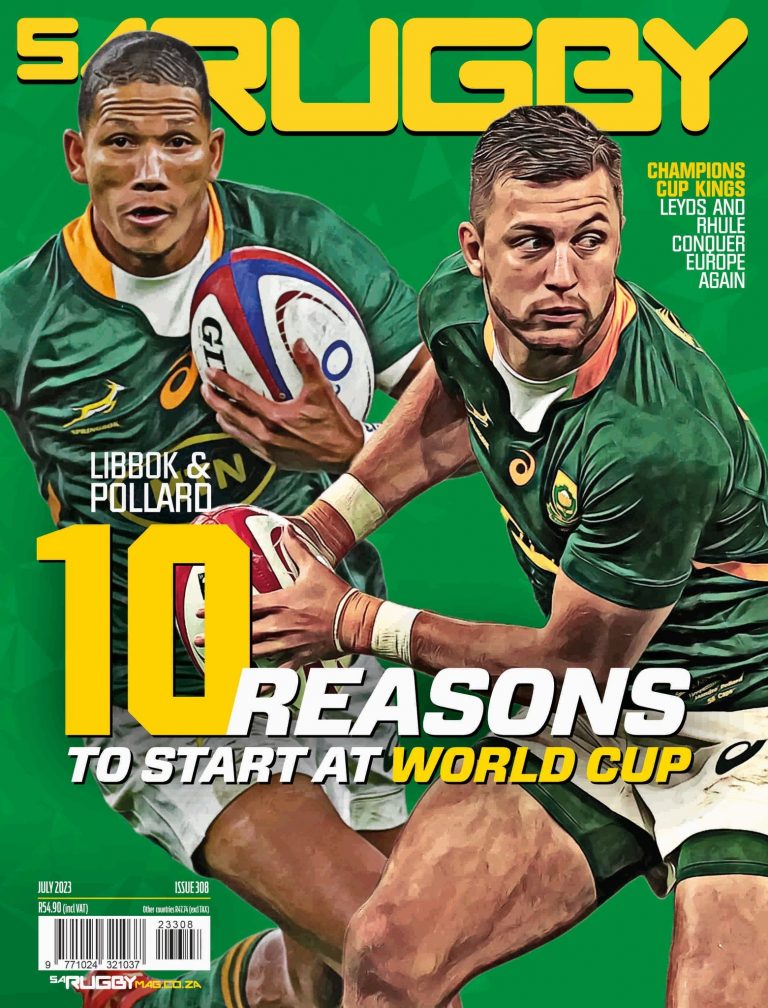
KEO News Wire
South African rugby the winner on URC derby day
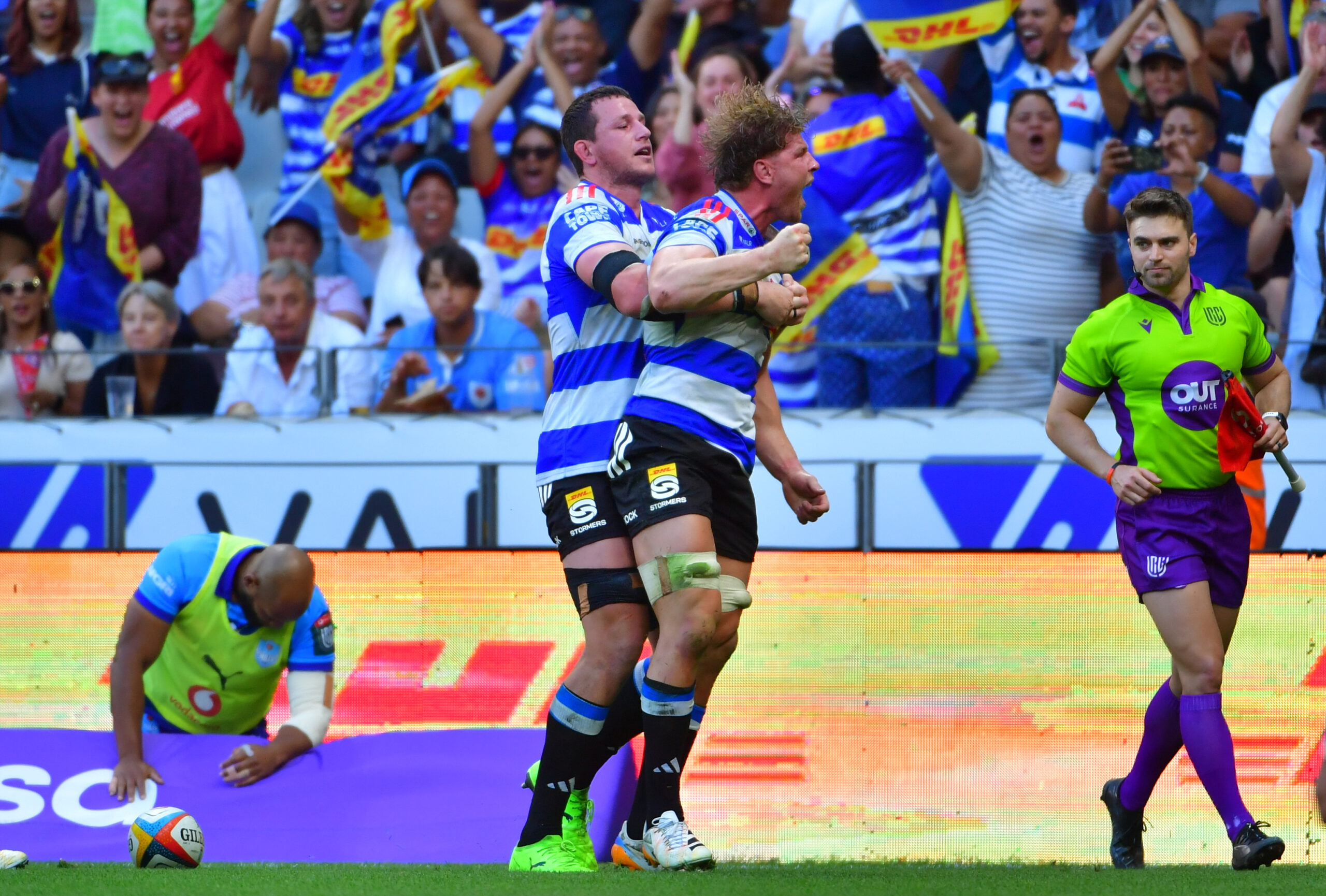
If you want to know why the Springboks have won the most World Cups, have a look at Saturday’s two South African URC derbies in Durban and Cape Town. South African rugby was the winner, writes Mark Keohane.
It was brutal knockout rugby that showcased the mental toughness of South Africa’s players when they play for something that means something to them.
What matters most to South African rugby fans is winning the World Cup, beating the All Blacks and England and winning the local derbies.
France and Ireland are ‘nice to have wins’ and have rarely been a hyped occasion, outside of the past few seasons, but the All Blacks are always the big occasion.
In domestic rugby, it is the local derby, specifically when the Stormers play the Bulls. The Lions and Sharks are big matches, and part of the derby fabric but traditionally when one talks north v south or south v north it is the Bulls v Stormers or the Stormers v Bulls.
In Cape Town, in front of 54 000 at the DHL Stadium, the occasion justified the traditional hype. Form was irrelevant, the Stormers nine successive wins in all competitions and the Bulls’ five successive defeats, meant nothing. On derby day, it is only about what happens between the first and last whistle.
The Bulls started with 10 of the current Springboks squad and the Stormers started with seven of the current Springboks squad. All 17 players delivered on their pedigree in the most testing of atmospheres and demanding of conditions as the big Cape wind blew with enthusiasm and vigour.
The defence on both sides matched the presence of the wind, but ultimately the Stormers bench proved superior in the final few minutes and the decisive match-winning try came from a line out maul. The Stormers had turned down two kickable penalties at posts in the final five minutes and opted for the potential of five points.
They got the five pointer to break the 8-all deadlock and lead 13-8 with 30 seconds to play. They then defended their line for the final Bulls play and forced an error from Springboks Test veteran and Test centurion Wille le Roux.
There will be plenty said of referee Griffin Colby, who awarded 30 penalties, split evenly between the two teams. Colby struggled with the occasion, was out of his depth and in the first five minutes on three occasions apologised to both teams for his errors. This allowed for every player to believe they had the right to ask for another apology. Colby never recovered and it was not his finest 81 minutes. Hopefully, he will be better for the experience.
In Durban, in the early game, big name players had moments, but the decision-making and game management let down the hosts, who refused kickable penalties at posts to extend a 22-18 lead to 25-18.
And the Lions, like so many good Springboks teams, refused to go away. They tackled and defended and when they got one chance in the final play of the game they made it count with a winning five pointer.
Springboks coach Rassie Erasmus would have loved the match-ups. Big pressure moments tell you more about a player than 73-0 wins in Cardiff.
KEO: HOW I CALLED THE STORMERS WIN BUT GOT DONE BY THE LIONS
Individually, there were lots of winners, as many losers, but most pertinently, there was a collective victory for the mental strength and state of the South African domestic game.
URC LATEST: ALL THE STATS AND REPORTS
SA RUGBY MAG LATEST ON SA’S URC QUARTET
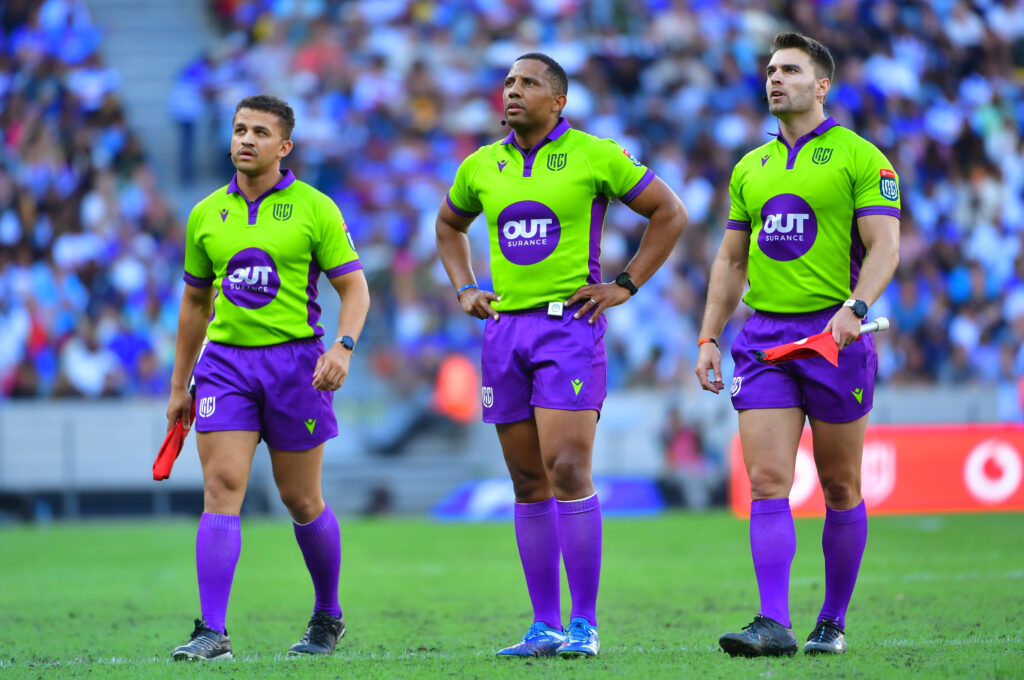
Photo: Grant Pitcher/Gallo Images
Lions scored a try after the hooter to beat the Sharks in Durban.
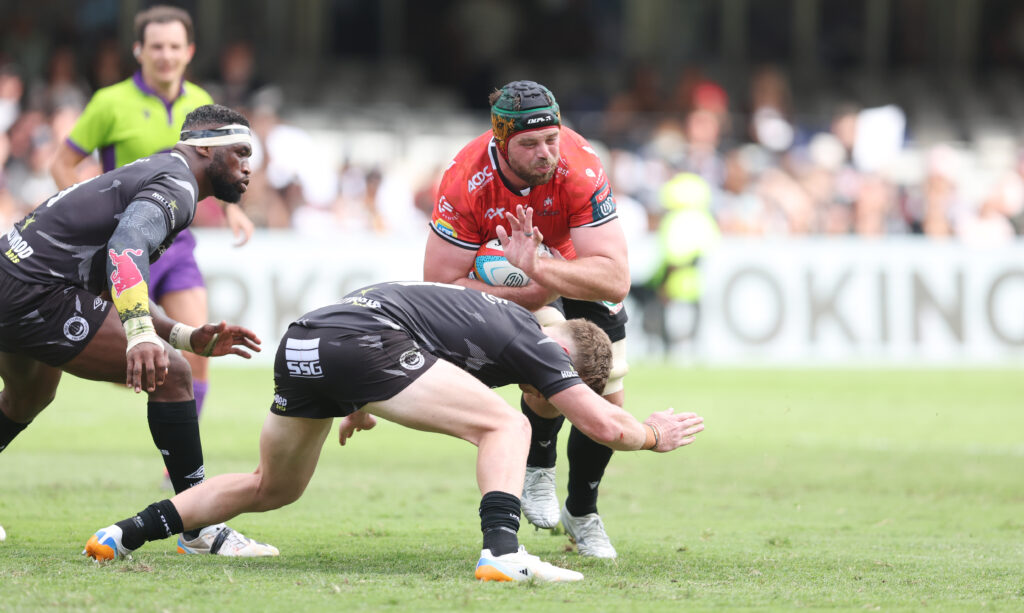
Photo: Steve Haag/Gallo Images
KEO News Wire
Cape Town showdown headlines pivotal URC round
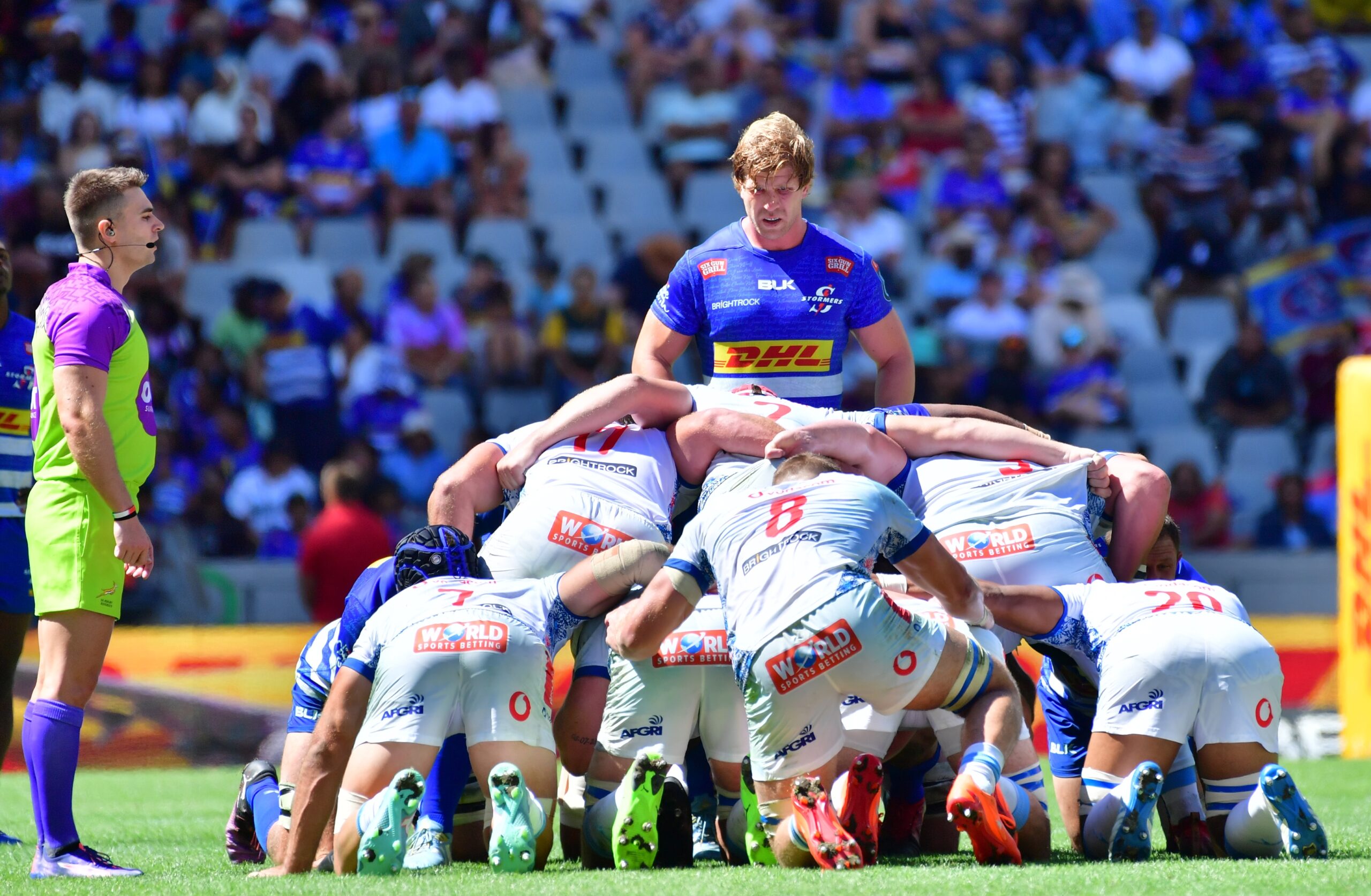
Round 9 of the United Rugby Championship takes centre stage this weekend, and all attention will be on a sold-out Cape Town Stadium, where the unbeaten Stormers take on the Bulls in a clash that could shape the South African race to the playoffs.
Stormers vs Bulls – top billing in the South
The Stormers have been near-flawless this season, winning all seven of their matches to sit atop the URC table. With a potent mix of youth and Bok firepower, John Dobson’s side has made Cape Town a fortress. Damian Willemse and Sacha Feinberg-Mngomezulu have led the charge on attack, while a hardened pack provides the platform.
The Bulls arrive with just three wins but with renewed belief after their win over Saracens in Europe. With Handré Pollard at flyhalf and the experience of Willie le Roux at fullback, they have the weapons to strike. If they can match the Stormers physically and slow their tempo, they’ll fancy a shot at an upset.
Expect fireworks: the last five meetings between these sides have all been decided by fine margins, and with both chasing playoff spots, neither can afford a slip.
STORMERS – 15 Warrick Gelant, 14 Suleiman Hartzenberg, 13 Wandisile Simelane, 12 Damian Willemse, 11 Leolin Zas, 10 Sacha Feinberg-Mngomezulu, 9 Cobus Reinach, 8 Evan Roos, 7 Ben-Jason Dixon, 6 Ruan Ackermann, 5 JD Schickerling, 4 Salmaan Moerat (c), 3 Neethling Fouche, 2 Andre-Hugo Venter, 1 Ali Vermaak.
Bench: 16 Lukhanyo Vokozela, 17 Ntuthuko Mchunu, 18 Sazi Sandi, 19 Adre Smith, 20 Ruben van Heerden, 21 Paul de Villiers, 22 Stefan Ungerer, 23 Jurie Matthee.
BULLS – 15 Willie le Roux, 14 Sebastian de Klerk, 13 Canan Moodie, 12 David Kriel, 11 Stravino Jacobs, 10 Handre Pollard, 9 Paul de Wet, 8 Jeandre Rudolph, 7 Elrigh Louw, 6 Marco van Staden, 5 Ruan Nortje (c), 4 Cobus Wiese, 3 Wilco Louw, 2 Johan Grobbelaar, 1 Gerhard Steenekamp.
Bench: 16 Akker van der Merwe, 17 Jan-Hendrik Wessels, 18 Khuta Mchunu, 19 Ruan Vermaak, 20 Reinhardt Ludwig, 21 Nizaam Carr, 22 Embrose Papier, 23 Devon Williams.
Sharks vs Lions – must-win for both
Elsewhere in South Africa, the Sharks host the Lions in a Durban derby loaded with tension. The Sharks have shown signs of revival under interim coach JP Pietersen, with recent wins over Saracens and the Bulls injecting belief into a season that started poorly.
The Lions have had flashes of brilliance and just enough consistency to stay in the playoff hunt but a loss here could undo the progress made over the past month. Wessel Roux’s arrival as forwards coach is a key shift, and his pack will need to front up against a Sharks side that’s regained its bite.
Weather could play a role in Durban, with rain forecast around kick-off, which may favour the home side’s more structured approach.
SHARKS – 15 Aphelele Fassi, 14 Edwill van der Merwe, 13 Ethan Hooker, 12 Andre Esterhuizen (c), 11 Makazole Mapimpi, 10 Jordan Hendrikse, 9 Grant Williams, 8 Manu Tshituka, 7 Vincent Tshituka, 6 Siya Kolisi, 5 Emile van Heerden, 4 Jason Jenkins, 3 Hanro Jacobs, 2 Bongi Mbonambi, 1 Ox Nche.
Bench: 16 Eduan Swart, 17 Phatu Ganyane, 18 Mawande Mdanda, 19 Corne Rahl, 20 Phepsi Buthelezi, 21 Nick Hatton, 22 Jaden Hendrikse, 23 Siya Masuku.
AFRICA PICKS: URC Round 9 – Keo’s Accumulator
LIONS – 15 Quan Horn, 14 Kelly Mpeku, 13 Erich Cronje, 12 Bronson Mills, 11 Eduan Keyter, 10 Chris Smith, 9 Morne van den Berg, 8 Francke Horn (c), 7 Ruan Venter, 6 Jarod Cairns, 5 Reinhard Nothnagel, 4 Etienne Oosthuizen, 3 Asenathi Ntlabakanye, 2 PJ Botha, 1 SJ Kotze.
Bench: 16 Franco Marais, 17 Edward Davids, 18 RF Schoeman, 19 Dylan Sjoblom, 20 Darrien Landsberg, 21 Siba Qoma, 22 Nico Steyn, 23 Richard Kriel.
Irish interpro battles heat up
In the north, Ulster and Munster meet in Belfast on Friday in a clash with top-four implications. Ulster boast an unbeaten home record this season and lead the competition in total points scored, while Munster sit second on the table despite a frustrating recent loss to Leinster.
Leinster, meanwhile, host Connacht at the Aviva in a fixture they’ve dominated in recent years. The defending champions have quietly built momentum after a slow start, winning six in a row. Connacht are in danger of slipping further after five losses in six and will need a dramatic turnaround to halt their Interpro losing streak.
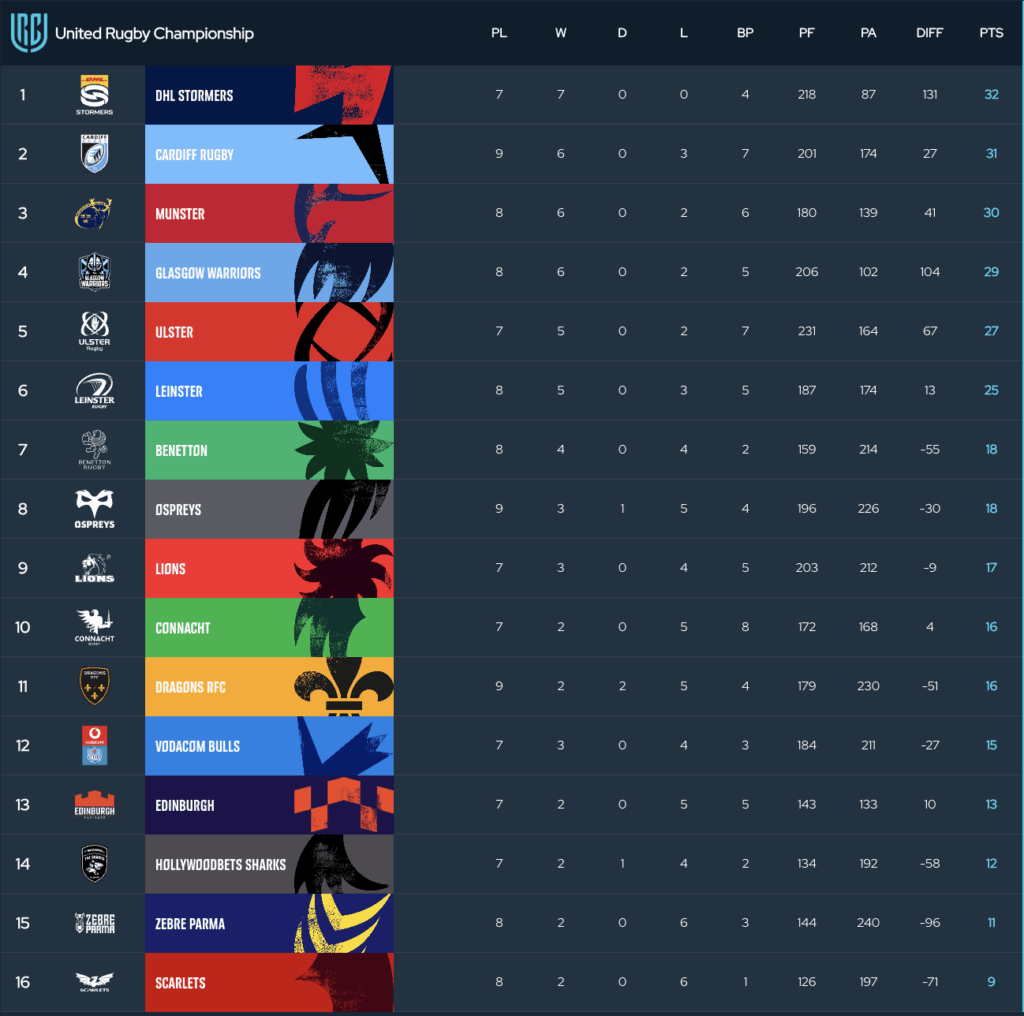
Round 9 fixtures
Friday, 5 January
Ulster vs Munster – Kingspan Stadium, Belfast
Saturday, 6 January
Leinster vs Connacht – Aviva Stadium, Dublin
Stormers vs Bulls – Cape Town Stadium, Cape Town (sold out)
Sharks vs Lions – Hollywoodbets Kings Park, Durban
KEO News Wire
Stormers still tops as Munster stumble
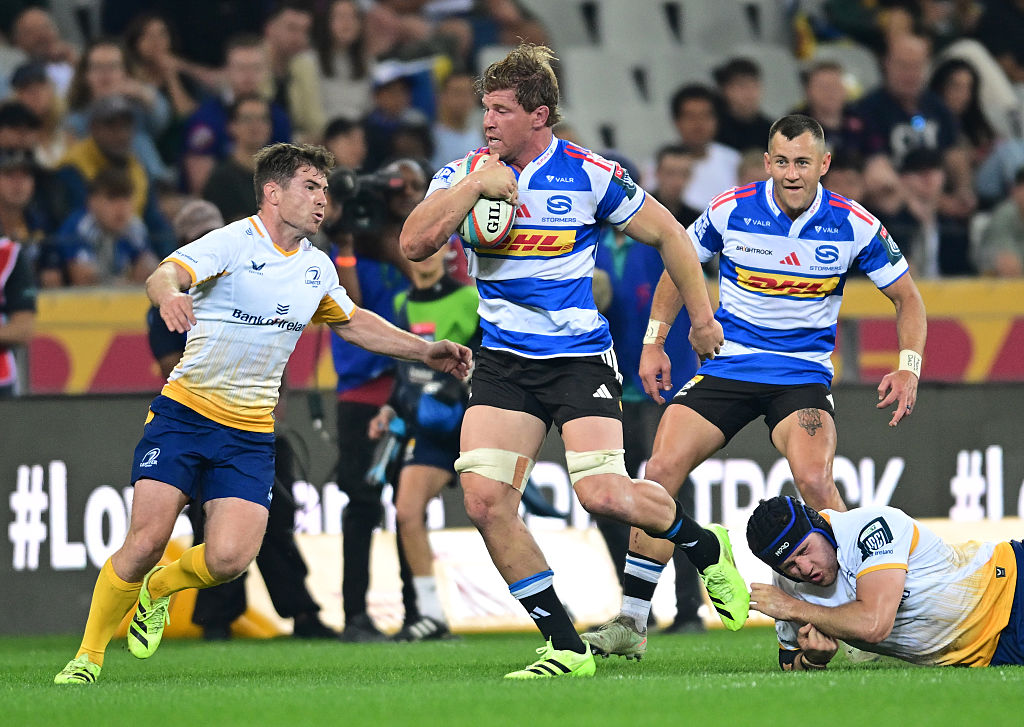
Munster’s failure to beat Leinster in Limerick means the Stormers end 2025 to the Vodacom United Rugby Championship, three points ahead of Munster and with a game in hand.
After an exciting weekend of the Vodacom United Rugby Championship, URC StatMaster has identified the top players from R8 along with the overall top team and player performances from the league so far.
Click Here To View Vodacom URC Team Stats
Top Players From R8
Carries: 25 Fletcher Anderson (Scarlets)
Defenders Beaten: 7 Kyle Steyn (Glasgow Warriors)
Lineouts Won: 8 Tom Ahern (Munster Rugby)
Metres: 131 Mason Grady (Cardiff Rugby)
Passes: 95 Aled Davies (Cardiff Rugby)
Tackles: 28 Harri Deaves (Ospreys)
Overall Top Players After R8
Carries: 123 Alun Lawrence (Cardiff Rugby)
Defenders Beaten: 33 Jacob Stockdale / Sebastian de Klerk (Vodacom Bulls)
Kicks in Play: 67 Gareth Davies (Scarlets)
Lineout Steals: 7 Alex Soroka (Leinster Rugby)
Lineouts Won: 42 Marvin Orie (Hollywoodbets Sharks)
Metres: 490 Sebastian de Klerk (Vodacom Bulls)
Passes: 550 George Horne (Glasgow Warriors)
Tackles: 113 Harri Deaves (Ospreys)
Tries: 6 Louis Lynagh (Benetton) / Werner Kok (Ulster Rugby)
Turnover Won: 11 Samuele Locatelli (Zebre Parma)
Overall Top Team Season Totals
Carries: 1255 Glasgow Warriors
Defenders Beaten: 208 Glasgow Warriors
Kicks in Play: 248 Cardiff Rugby
Metres: 3683 Glasgow Warriors
Points: 231 Ulster Rugby
Tackles: 1307 Dragons RFC
Tries: 33 Ulster Rugby
Turnover Won: 57 Munster Rugby
Visits To 22: 108 Glasgow Warriors
KEO News Wire
Salute! Siya & Sacha deals super for the Stormers
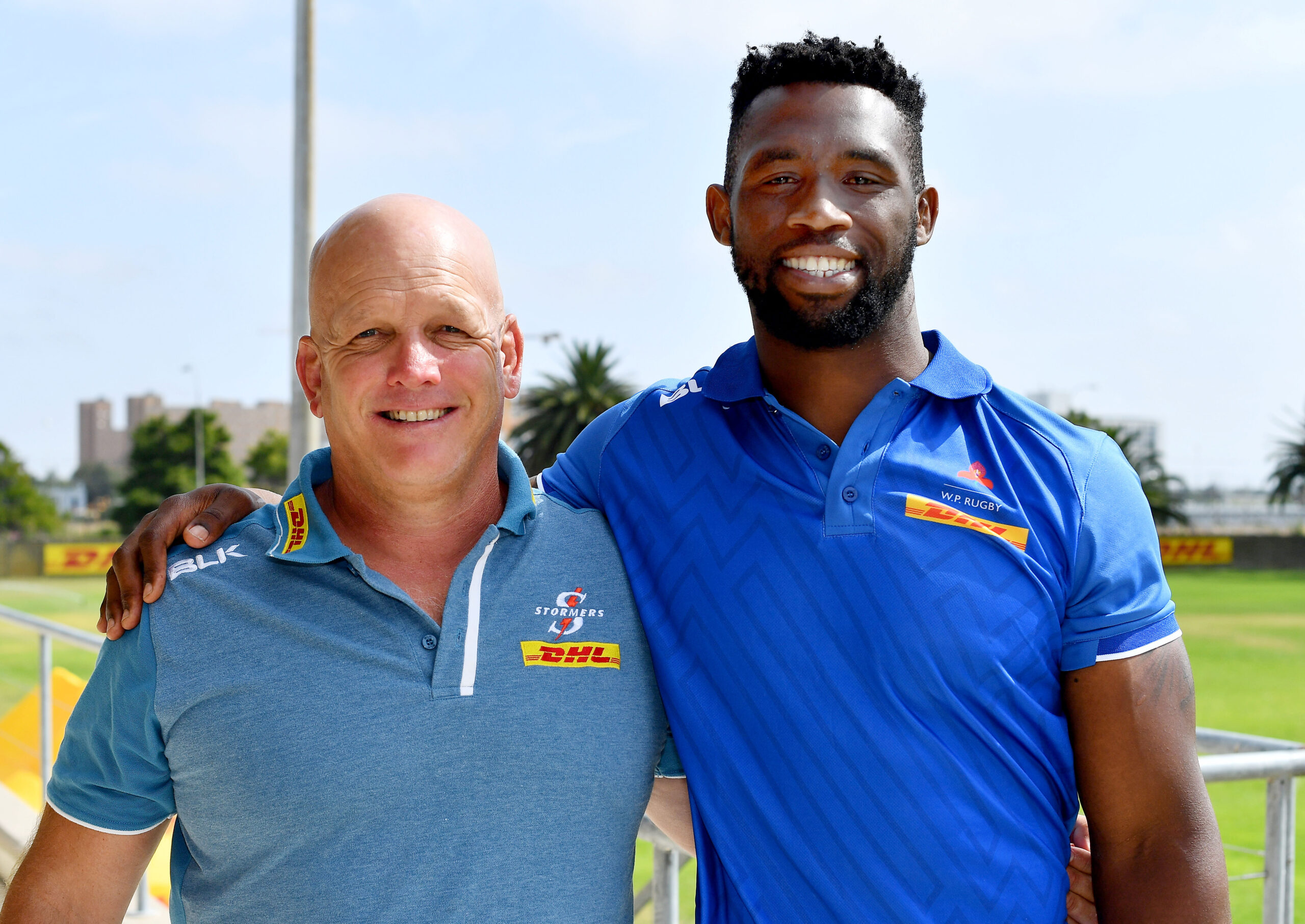
Siya Kolisi’s homecoming to Cape Town next season, aligned with the signature of Sacha Feinberg-Mngomezulu, is the biggest of salutes from Stormers coach John Dobson and the club’s owners to their local support base. Christmas has come for the Stormers.
Feinberg-Mngomezulu’s renewal and contract extension from 2027 to 2029 was the biggest statement of the new ownership, Red Disa Investments, bearing in mind that Damain Willemse’s big signature was secured just before the new ownership.
SASHA’S SIGNATURE THE BIGGEST STORMERS STATEMENT
The signings of so many talented youngsters, coupled with Springboks Cobus Reinach and Wilco Louw, made for the best transfer news for Stormers supporters.
Then, on Tuesday, the 23rd December, came confirmation that the King of Cape Town Rugby, Springboks World Cup-winning captain Kolisi, would be returning home to Cape Town to be closer to his family and to the club he holds so dear in his heart, the Stormers.
It all began for Kolisi professionally as a rugby player in Cape Town and he is one of the elite club of Stormers Centurions.
Kolisi played 118 matches for the Stormers between 2011 and 2021 and 34 matches for Western Province in the same period.
Kolisi, since leaving the Stormers, had stints at the Sharks, Racing 92 and back at the Sharks, but everything suggested a return to Cape Town is what he wanted most, and the Stormers leadership, through coach Dobson and owner Johan le Roux, have facilitated the perfect final chapter to Kolisi’s rugby-playing career.
Few would counter the view that Kolisi deserves nothing less than to write his own final chapter, between now and the 2027 Rugby World Cup in Australia. He deserves every bit of goodwill and belief that he is getting from the Stormers decision-makers.
The Stormers, seven from seven in the 2025/26 URC season and two from two in the 2025/26 Investec Champions Cup, have enjoyed an unprecedented start to their season.
The signature of Kolisi cements the most glorious of month’s for the club.
Kolisi was all humility and gratitude to the Sharks for granting him an early release.
And rightly so.
Kolisi, who played his 100th Test for the Springboks in November, will add enormous value to the Stormers, as a player, a leader and a mentor.
ALL THE REPORTS: SIYA’S RETURN TO THE STORMERS
Stormers Rugby CEO Johan le Roux said: ‘Siya is a national icon who has such a strong connection to our team and our supporters. He is also a family man who wants to be there for his children as much as possible.
‘These are values that resonate with our club and given the significance of our heritage in defining where we want to go, we are very happy to welcome Siya back to hopefully see out his career in the jersey he wore when it started.
Kolisi said that returning to Cape Town is a significant moment for him and his family.
‘I have such incredible memories of my time at the DHL Stormers, the way I was embraced by the fans in my formative years has never left me. My family is in Cape Town and it is important to me to be close to them. This move gives me the chance to do that while also giving back to the team and fans who made such a big contribution to the player and person I am today.
‘I am looking forward to contributing in any way I can to the future success and happiness of this special club and its incredible supporters,’ he said.
Director of Rugby John Dobson said: ‘We have got an outstanding crop of loose forwards in our squad and a number of very strong young leaders, with the last three Junior Springbok captains all on our books.
‘Siya will be able to help develop these players and mentor them in a way that nobody else could, given what he has achieved and what he represents to all South Africans and especially our fans.
‘We are very aware of the load that he has carried professionally and personally over the last few years, but what is so encouraging is the way that he has bought into helping us reach the goals we have set for ourselves in developing our squad as we build towards Project 2029.’
KEO News Wire
Stormers go 7-from-7 as Sharks feast on Bulls
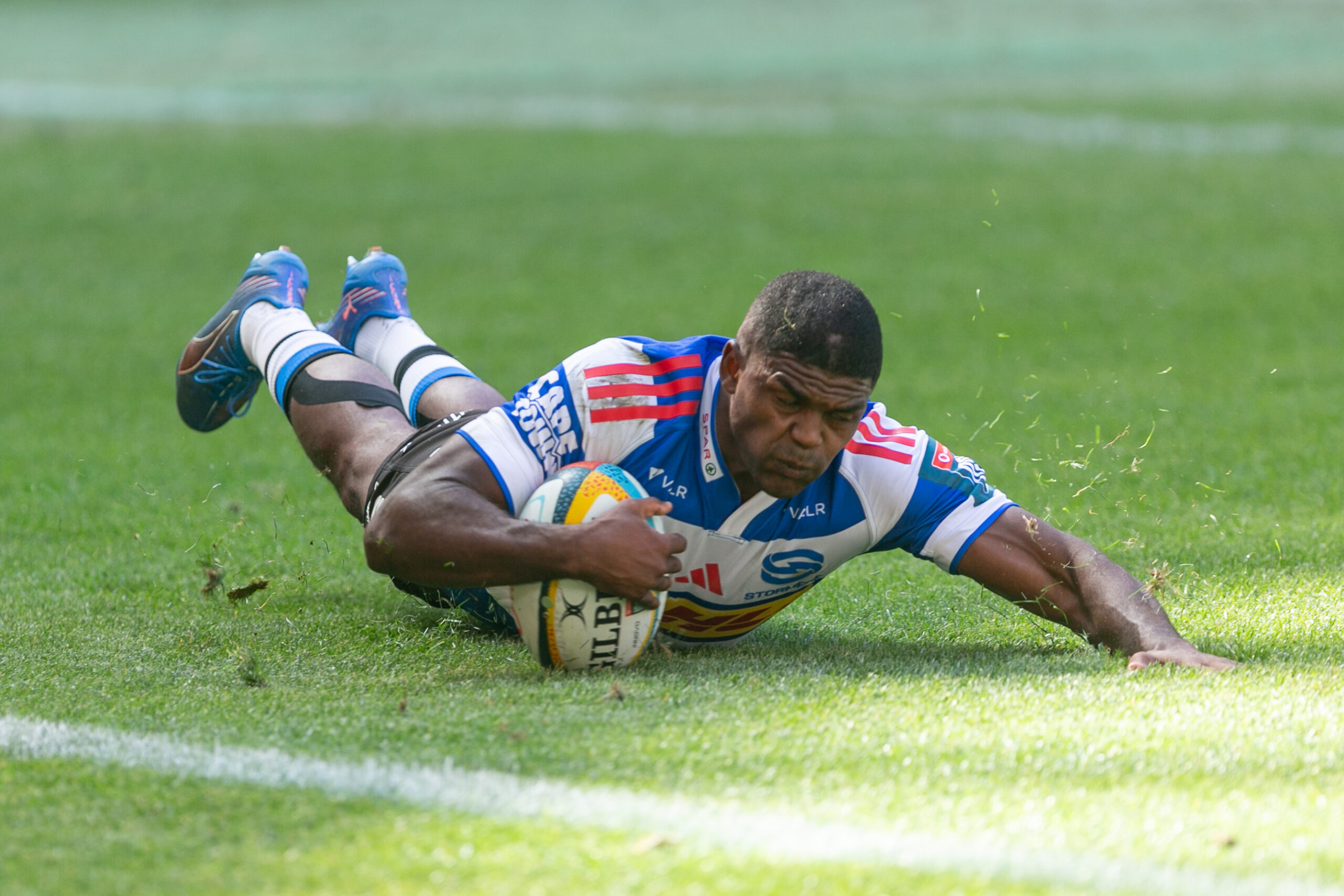
Perfection, in results for the hosts in Cape Town, as the Stormers went 7-from-7 in the URC, and redemption, in terms of hope, for the Sharks in Durban, writes Mark Keohane.
The perfect Stormers were imperfect in scoring five league points against the Lions. The Stormers won 34-27 at the DHL Stadium, and the Sharks made it two from two in all competitions in finishing off the Bulls in an intense South African derby in the Vodacom United Rugby Championship.
The Stormers close out 2025 as the form team in the United Rugby Championship, going 7-from-7 to finish the year top of the URC table with 32 points from a possible 35. Add their two wins from two in the Investec Champions Cup, and the Cape side are nine-from-nine across all competitions, with six victories coming away from the DHL Stadium. No team in Europe or South Africa has matched the consistency, travel resilience, or mentality of this Stormers squad.
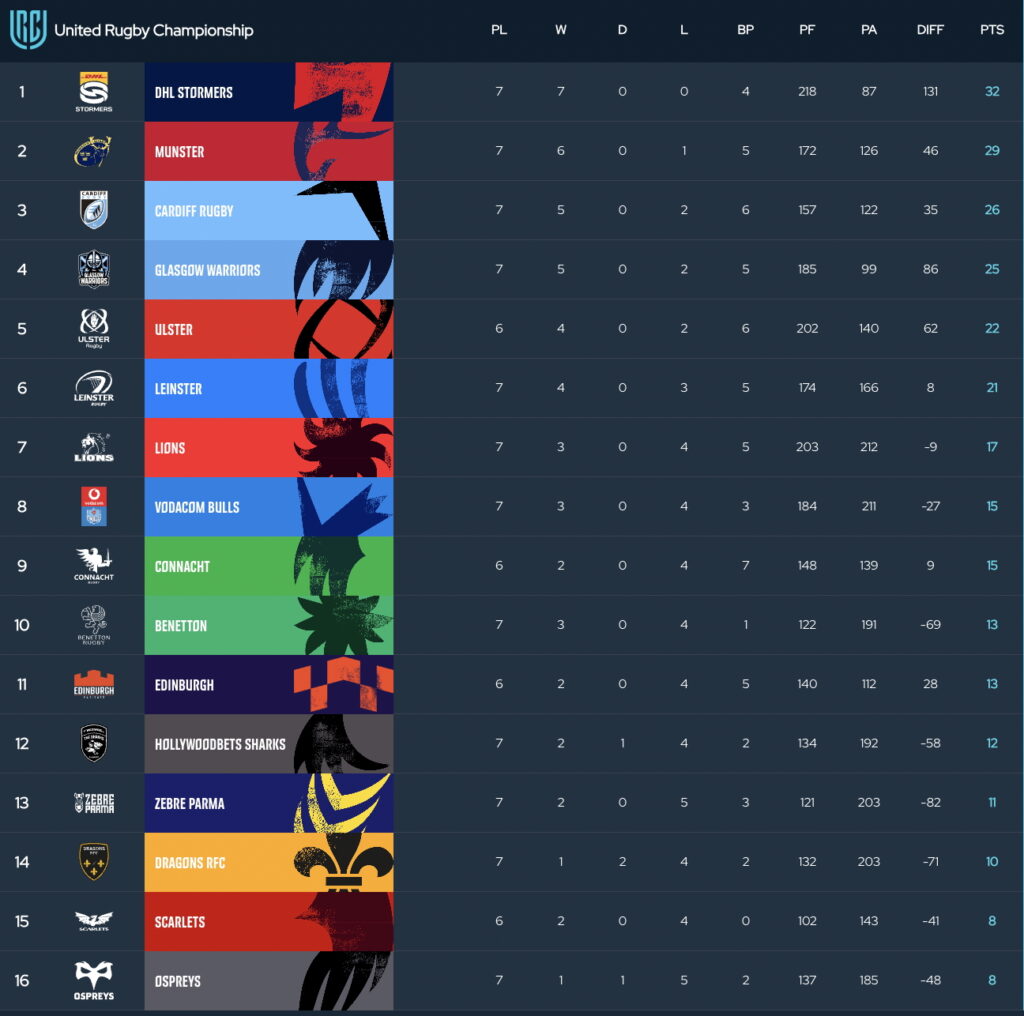
Screenshot
The Stormers’ success is built on a culture that doesn’t crack under pressure.
Even when off the boil for long periods of the 80 minutes, they find a way. Even when the rhythm is disrupted, the leadership and belief remain. This is a team that defends like champions, attacks with confidence, and wins when they’re not close to their best which is the mark of a genuine title contender.
The signing of Sacha Feinberg-Mngomezulu until 2029 is another statement of intent.
STORMERS OWNERS MAKE A STATEMENT
The Springboks’ breakout star of 2025, a Test match general with the temperament of a veteran and the skills of a modern match-winner, has committed to Cape Town for the long term. His presence anchoring the next generation is as significant as any result this season. The future of Stormers rugby looks settled and bright.
Saturday at the DHL Stadium also delivered a moment of significance when Sacha Feinberg-Mngomezulu met Stormers and Springbok icon Percy Montgomery.

The original ice-cold No 15, whose boot carried South Africa to the 2007 Rugby World Cup, meeting the new face of Stormers playmaking was a passing-of-the-torch moment Cape Town supporters will remember.
But Cape Town wasn’t the only South African rugby city celebrating.
In Durban, the Sharks beat the Bulls in front of a capacity Kings Park crowd, delivering their best performance of the season.
It was physical, composed, and emotional, with Siya Kolisi’s influence visible in every collision and every carry.
Andre Esterhuizen was immense again, imposing himself with the same brutality and precision that has defined his 2025 season for club and country.
Credit also go to JP Pietersen, only a fortnight into his early coaching leadership but already bringing clarity, calm, and a winning edge to the Sharks.
A World Cup winner in 2007, Pietersen’s understanding of big-occasion rugby was obvious as the Sharks controlled the derby with intelligence and impact.
The final weekend of 2025 showcased everything that defines South African rugby: big crowds, powerful derbies, world-class players, and teams capable of beating anyone, anywhere.
With the Springboks ending the year ranked No 1 in the world, and the Stormers ranked No 1 in the URC, South Africa dominates both the Test and club landscape.
ALL THE LATEST URC REPORTS AND NEWS

Photo: Steve Haag Sports/Gallo Images
KEO News Wire
Sacha signature the biggest statement from Stormers’ owners
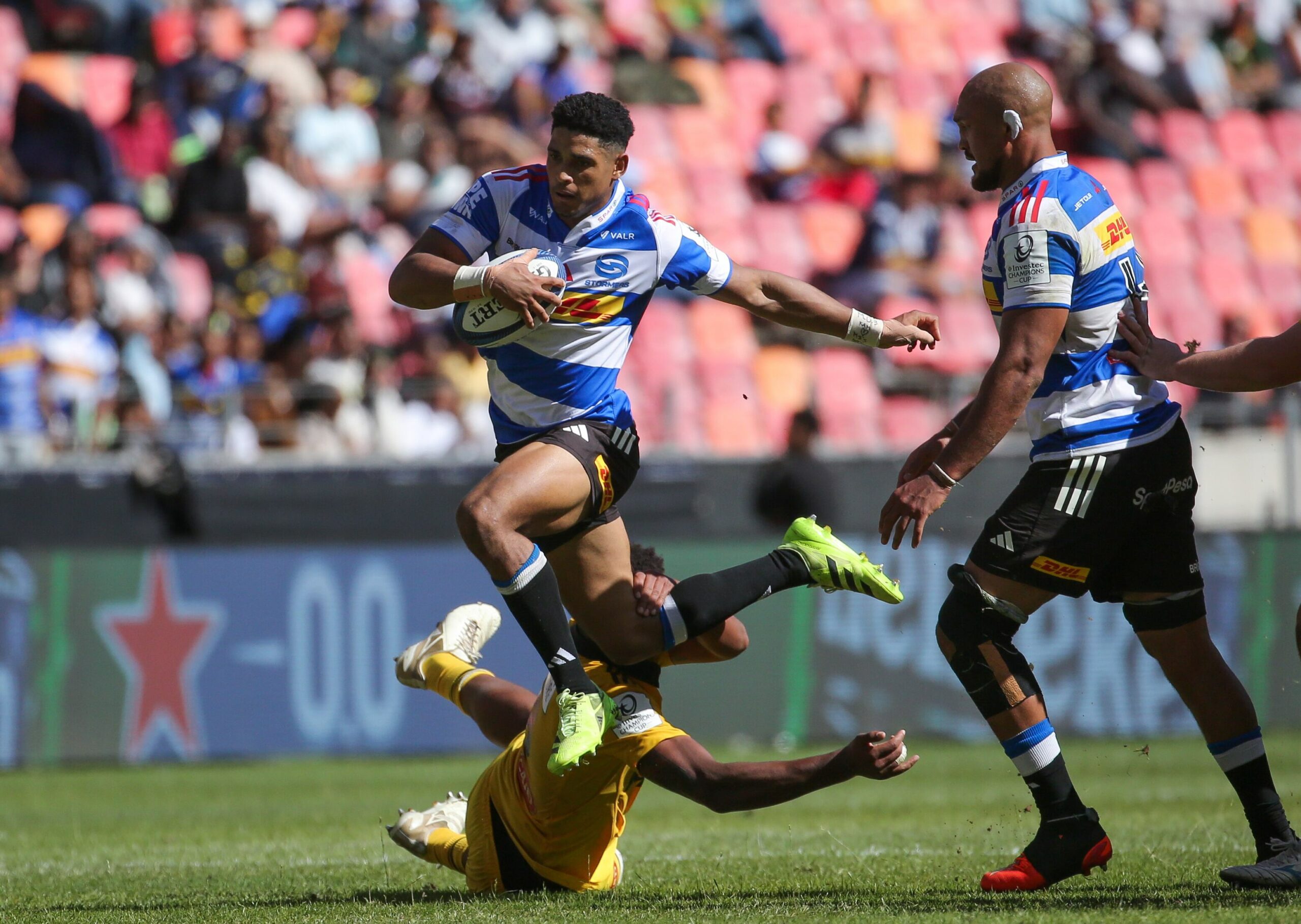
Red Disa Investments, the owners of the Stormers, made the biggest statement in securing the signature of Sacha-Feinberg Mngomezulu until the end of the 2029 season.
This is a club, based in the most sought after tourist city in the world, with an ambition to be the most sought after rugby club on the planet, and a club whose players are among the sport’s hottest property.
Right now, none is sizzling more than Feinberg-Mngomezulu, a home grown talent, whose signature was secured to 2027, but who now will remain in Cape Town beyond 2027 as part of the Stormers and coach John Dobson’s project to make the Stormers the No 1 club in the sport.
Feinberg-Mngomezulu could have picked the city of his choice, in South Africa or anywhere else in the rugby playing world, as his next club-rugby home base. It is the biggest compliment to Dobson and the Stormers owners, led by CEO Johan le Roux, that the very best of the Cape Town-born and raised players want to remain at the Stormers.
Le Roux, among the Red Disa ownership, doubles his role as the CEO. He has been transparent in the past year that the club ethos was not going to be one of throwing money at big name players for the sake of it.
The club ambition is such that the right players would be sought and retained. It is about culture and understanding the club, its supporters and the history of the Stormers.
Local talent will always be a priority, keeping the local talent at the club aligns with this priority and, where possible, another investment would be bringing back in-form big names who had previously played for the Stormers.
Wilco Louw, the most destructive tighthead scrumming prop, is returning to the Stormers, having last played for the club in 2017. Louw transferred to London’s Harlequins and then to the Bulls. He is the most sought after tighthead in world rugby.
The Stormers got him for the 2026/27 season.
They also got Springboks scrumhalf Cobus Reinach to return to South Africa after nearly a decade playing for the Saints and Montpellier in England and France. They did this and kept SA under 20 halfback and local lad Imad Khan, who was the Player of the Match in the Investec Champions Cup match against Bayonne in France.
Damian Willemse, Evan Roos and BJ Dixon all committed to staying in Cape Town and there has been investment in the leadership and playing qualities of former SA under 20 captain Salmaan Moerat and veteran loose-forward Deon Fourie. Coaching pathways have been created for club icons Brok Harris and Dewald Duvenhage and an intense and detailed talent identification programme has ensured the best of the young brigade remain in Cape Town.
Outside backs Leolin Zas and Suleiman Hartzenberg are part of the future, so too midfielder Jonny Roche and flyhalf Jurie Matthee and utility flank/lock Connor Evans.
Paul de Villiers, another former SA under 20 captain, is thriving as the successor to Fourie, whose early season was cut short through injury.
Dobson also secured SA under 20 rugby captain and SA under 19 cricket captain Riley Norton’s signature, as well as the prized schoolboy asset Markus Muller, who matriculated from Paarl Gim a month ago. The prop resources are huge, from club centurions Frans Malherbe and Neethling Fouche, to the most exciting young talent in the country, including prop Zach Porthen, who made his Springboks debut a month ago, at just 21 years-old.
KEO & ZELS PREVIEW THIS WEEKEND’S DERBIES
The Stormers Academy runs for the first time in a decade, but is streamlined and without freebies. There is a non-negotiable attitude toward youth, a refusal to bin experienced players because of age, and a crafted battle plan in how to maximise the legs and minds of those players the wrong side of 30.
Ruhan Nel and the Du Plessis cousins, Dan and Jean-Luc, Seabelo Senatla, Ali Vermaak and Scarra Ntubeni are very highly regarded.
BLUE & WHITE DELIGHT FOR STORMERS & adidas
Local is LEKKER is a real thing at the Stormers, among the players and coaches.
Of the current squad, 24 were schooled locally.
Dobson is a Cape rugby pureblood. This city province and club has been his home from the moment he played. His father, the late Paul Dobson, was an internationally celebrated rugby historian, Western Province referee and Master at Bishops for 30-plus years.
Dobson was born into Cape rugby.
He understands the Cape rugby landscape like no other coach in this country. He lived it as a schoolboy, club and provincial club player and did his entire rugby coaching apprenticeship within the structures of the Stormers. He coached the juniors at Western Province, the seniors at Western Province and finally the Stormers, who he guided to the URC title in its inaugural season.
The CEO Le Roux breathes local rugby. He attended Paul Roos.
STUNNING STORMERS REBRAND IS A REBOOT
The Stormers home support base is the best in the country, in crowd attendance, in social media interest and among the most popular among broadcast statistics.
Cape Town is consistently ranked as one of the most visited tourist attractions by overseas travel publications and travel critics.
Cape Town is also home to the Stormers and the city and rugby club are a match made in marketing heaven.
KEO News Wire
Stormers lead the SA charge in Investec Champions Cup play-off race
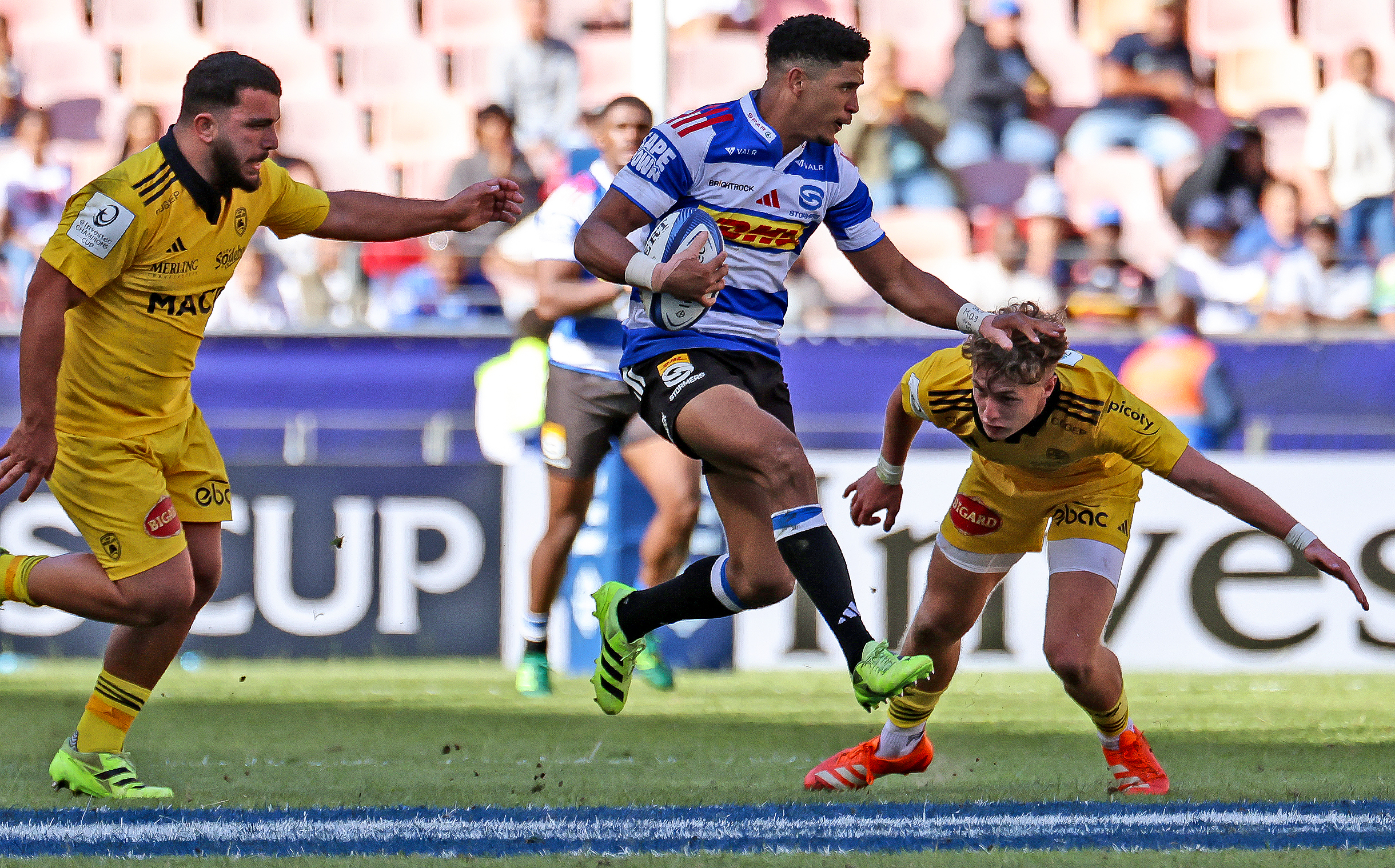
John Dobson’s Stormers have played themselves into contention to host a play-off in the Investec Champions Cup. The top eight teams, from the competing 24, play at home in the last 16, which will happen in April in 2026.
The Stormers are one of just six teams unbeaten after the opening two-round block of Europe’s most prestigious club rugby competition.
They lead Pool 3 on points differential from Irish club giants Leinster, who have won the title four times. Leinster are also unbeaten.
With each title comes the sought after star, and France’s Toulouse, with six stars in the 30 year competition history, tells you just how difficult it is to win the Champions Cup.
Last season’s finalists, Bordeaux and Northampton Saints, were drawn in the same Pool this season and both are unbeaten and lead the overall standings with the maximum league points and the best points differential.
Bristol’s Bears, also in Pool 4 with Bordeaux and the Saints, are also unbeaten and France Smith’s Glasgow Warriors are two from two after their stunning 28-21 home win against Toulouse. The latter led 21-0 at halftime.
Glasgow’s win is among the greatest in Pool stage history.
INVESTEC CHAMPIONS CUP 2025/26 LEAGUE AFTER 2 ROUNDS
- Saints – 10 league points, plus 53 points differential
- Bordeaux – 10 league points, plus 42 differential
- Warriors – 10 league points, plus 12 differential
- Bristol – 9 league points, plus 50 points differential
- Stormers – 9 league points, plus 30 points differential
- Leinster – 9 league points, plus 25 points differential
- Harlequins – 6 league points, plus 37 points differential
- Saracens – 6 league points, plus 32 points differenetial
- Toulouse – 6 league points, plus 30 points differential
- Sale Sharks – 6 league points, plus 16 points differential
- Bath – 6 league points, plus 15 points differential
- Castres – 5 league points, plus 13 points differential
- Munster – 5 league points, plus 2 points differential
- La Rochelle – 5 league points, minus 2 points differential
- Toulon – 5 league points, minus 2 points differential
- Gloucester – 5 league points, minus 8 points differential
- Edinburgh – 5 league points, minus 20 points differential
- Sharks (SA) – 5 league points, minus 32 points differential
- Scarlets – 1 league point, minus 30 points differenetial
- Bulls – 1 league point, minus 58 points differential
- Leicester – 0 league points, minus 27 points differential
- Clermont – 0 league points, minus 58 points differential
- Pau – 0 league points, minus 59 points differential
- Bayonne – 0 league points, minus 63 points differential
The teams all return to the Prem, Top 14 and URC respectively for the next three weeks, before the Investec Champions Cup Round stages are completed on the weekends of the 9th, 10th and 11th & 16t h, 17th & 18th January.
The play-off dates, with home teams determined by their points tally, and then points differential:
-
Last 16 – 03/04/05 April 2026.
-
Quarter-finals – 10/11/12 April 2026.
-
Semi-finals – 01/02/03 May 2026
- Finas – Bilbao – 22/23/ May 2026
KEO News Wire
De Villiers among the elite in Investec Champions Cup
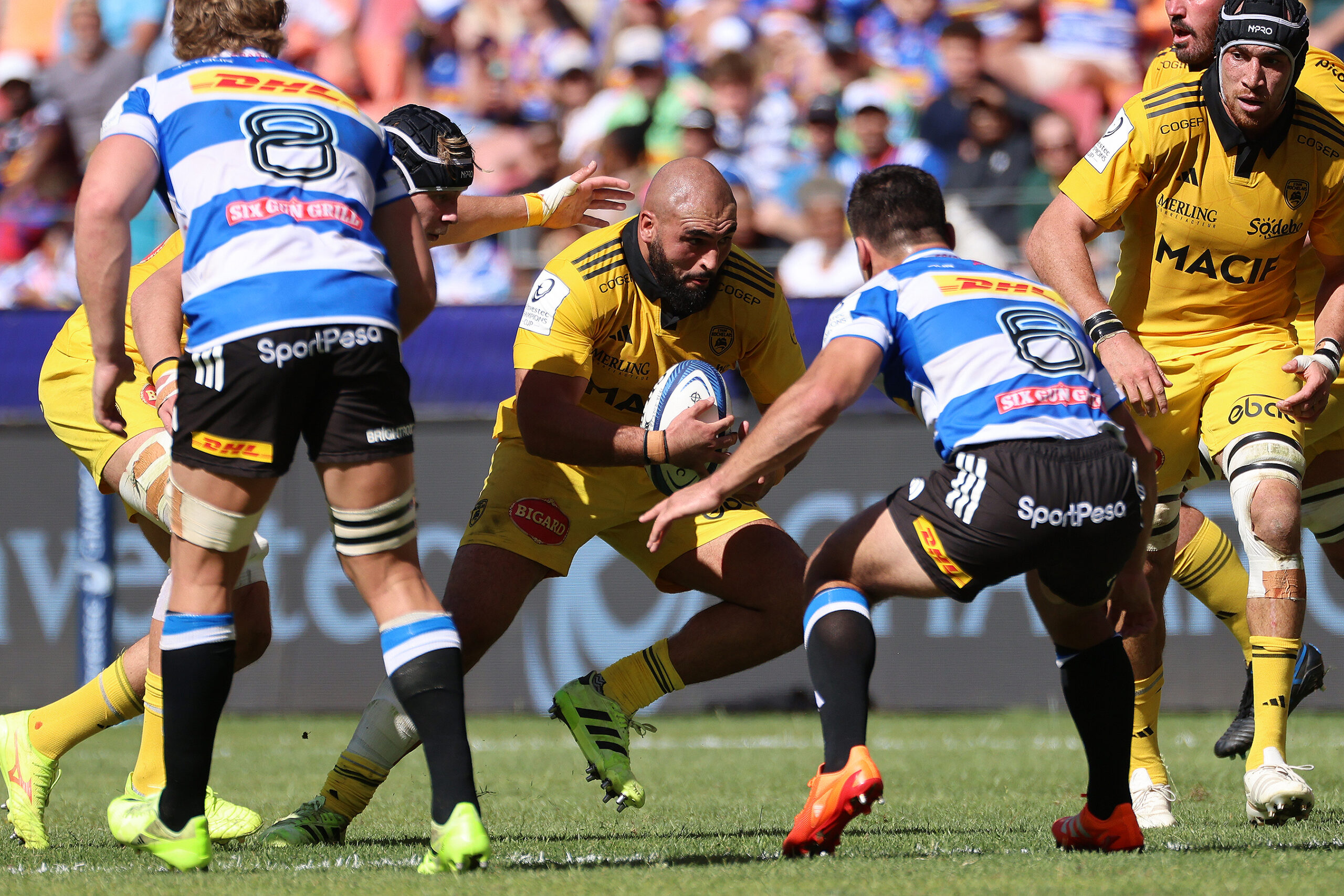
Stormers flanker Paul de Villiers has the joint most turnovers after the completed first block of this season’s Investec Champions Cup, with the opening fortnight of the competition and the EPCR Challenge Cup breaking records for viewership. De Villiers is among five nominations for Player of the Month.
Bulls supporters may not yet have an appreciation of the status of the Investec Champions Cup, with just 7300 attending the opener at Loftus against the 2024/25 champions Bordeaux, but elsewhere the tournament continues to command interest, at the grounds and through television, online and social media viewership.
The Stormers, having played their first competition ‘home’ game outside of Cape Town due to the unavailability of the DHL Stadium, still got a crowd of 17 000 for their win against La Rochelle, while plenty tuned into the Sharks home win against Saracens, even if awful weather conditions limited ground attendance.
The Keo & Zels show, on their social media channels, combined for a viewership of 1.2 million, whilst SA Rugby Magazine published 130 articles on the tournament in the past three weeks, and 230 social media posts across their platforms, as well as their WhatsApp Channel & the Keo & Zels WhatsApp Channel.
The EPCR reported that Broadcast audiences also surged, with peak TV viewership exceeding 2 million on France Télévisions for the RC Toulon v Bath Rugby clash, reinforcing the competitions’ status as must-watch sporting event.
Digital engagement also continued its upward trajectory year on year, demonstrated by 3.65 million total digital engagements, up from 2.75 million at the same stage last season, and 3 million YouTube highlight views, a 25% increase on last season.
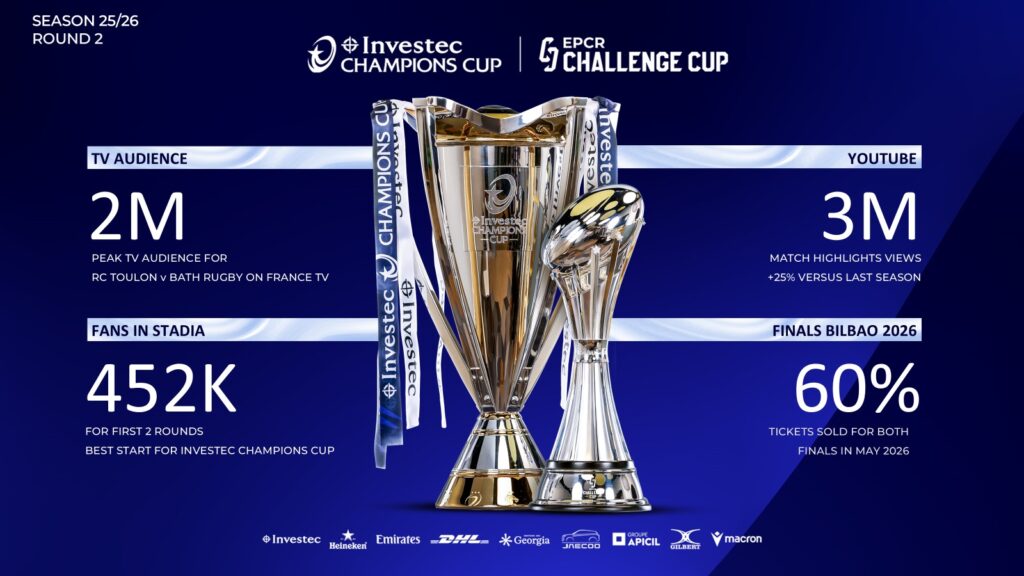
The EPCR also launched a brand-new Investec Champions Cup show, produced by Brian O’Driscoll and Craig Doyle’s 3 Rock production company and fronted by former French international Ben Kayser, celebrating the cities, culture and fans of the Investec Champions Cup – as well as the world-class Test match rugby in club colours.
Bordeaux’s French International flyhalf Matthieu Jalibert has won Investec Player of the Match in both Bordeaux’s wins, Stormers flyhalf Sacha Feinberg-Mngomezulu joined the list of players with the second most try assists in one match (4), with Toulouse and France No 9 Antoine Dupont’s 5 setting the standard.
Toulouse’s Jack Willis, the Top 14 and French rugby player of the year last season, has been imposing in this year’s opening two rounds, and, in the 21-28 defeat to Glasgow, made 25 tackles. Willis is ineligible for England selection because he plays his club rugby in France.
Toulouse’s Thomas Ramos has also thrived, at flyhalf in Round 1 and fullback in Round 2.
Across 42 high-quality matches in Rounds 1 and 2 of the Investec Champions Cup and EPCR Challenge Cup, Europe and South Africa’s leading clubs and players delivered compelling performances that set the tone for the rest of the campaign.
That exceptional standard of play is reflected in the Investec Champions Cup Player of the Month nominees, each of whom led by example and played a key role in guiding their teams to consecutive victories.
- Adam Hastings, Glasgow Warriors. Investec Player of the Match against Stade Toulousain during Glasgow’s unbelievable comeback in Round 2.
- George Hendy, Northampton Saints. Scored four tries in 2 Rounds and was Investec Player of the Match against Vodacom Bulls in Round 2.
- Paul de Villiers, DHL Stormers. Investec Player of the Match against Stade Rochelais in Round 2 and joint most turnovers so far in the competition.
- Matthieu Jalibert, Union Bordeaux Bègles. More points than any other player (28) thanks to three tries, five conversions and a penalty goal in two Rounds. Was the Player of the Match in both matches.
- Sione Tuipulotu, Glasgow Warriors. Hugely influential in Glasgow’s historic win against Stade Toulousain and one of the seasons’ top carriers.
Just six of the 24 teams are unbeaten in the opening fortnight.
In Pool 1, Franco Smith’s Glasgow are the only unbeaten team, with two wins from two. The quality and fight within the Pool is illustrated with with one league point separating second place Saracens (6) and fifth placed Sharks, from KZN, who have five points after the bonus-point home win against Saracens.
There is no unbeaten team in Pool 2, with Bath toping the table.
In Pool three, the Cape Town based Stormers are unbeaten and edge Leinster at the top of the table on points differential. Both teams have nine league points.
Last season’s finalists, Bordeaux and Northampton Saints were drawn in Pool 4, and the Saints are on top on points differential, with Bordeaux second and the unbeaten Bristol Bears third.
SPRINGBOKS STAND TALLEST FOR SOUTH AFRICA IN INVESTEC CHAMPIONS CUP
*Explaining the EPCR
European Professional Club Rugby (EPCR) is the organiser of the Investec Champions Cup and EPCR Challenge Cup. EPCR’s mission is to create outstanding rugby experiences for all key stakeholders, including leagues, clubs, players, match officials, unions, fans, broadcast and commercial partners, communities and the media.
The Investec Champions Cup and EPCR Challenge Cup feature clubs from the Gallagher Premiership, TOP 14 and United Rugby Championship. 42 clubs from three leagues and eight unions compete each season to win club rugby’s most elite titles. Broadcast to over 100 territories around the world, last season EPCR’s tournaments welcomed 1.5 million fans into stadia and achieved a broadcast audience of over 70 million viewers.
The EPCR Finals Weekend is a destination rugby weekend held in a different city every year.
On 22 and 23 May 2026, the vibrant Basque city of Bilbao will welcome the EPCR Challenge Cup Final and Investec Champions Cup Final to the stunning San Mamés Stadium, where 60% of tickets for the Bilbao Finals already sold,
Established in 2014 with headquarters in Lausanne, Switzerland, EPCR has the following members: Fédération Française de Rugby (FFR), Federazione Italiana Rugby (FIR), Irish Rugby Football Union (IRFU), Ligue Nationale de Rugby (LNR), Premier Rugby Ltd (PRL), PRO Rugby Championship DAC (URC), Rugby Football Union (RFU), Scottish Rugby Union (SRU) and Welsh Rugby Union (WRU).
The Board of EPCR has the following members: Dominic McKay (Chairman), Jacques Raynaud (EPCR CEO), Martin Anayi (URC), Emmanuel Eschalier (LNR), Simon Massie-Taylor (PRL), Mark McCafferty (independent director), Arnaud Nourry (independent director), Jérémie Lecha (FFR) and Kevin Potts (IRFU).
EPCR’s revenues are distributed on the basis of an equal three-way division to Premiership Rugby clubs, URC clubs and LNR clubs.
EPCR’s tournaments are run according to World Rugby’s Laws of the Game, and to World Rugby Regulations.
LinkedIn page: www.linkedin.com/company/
EPCR contact: [email protected]
KEO News Wire
Dylan Maart nominated for Investec Champions Cup Try of the Round
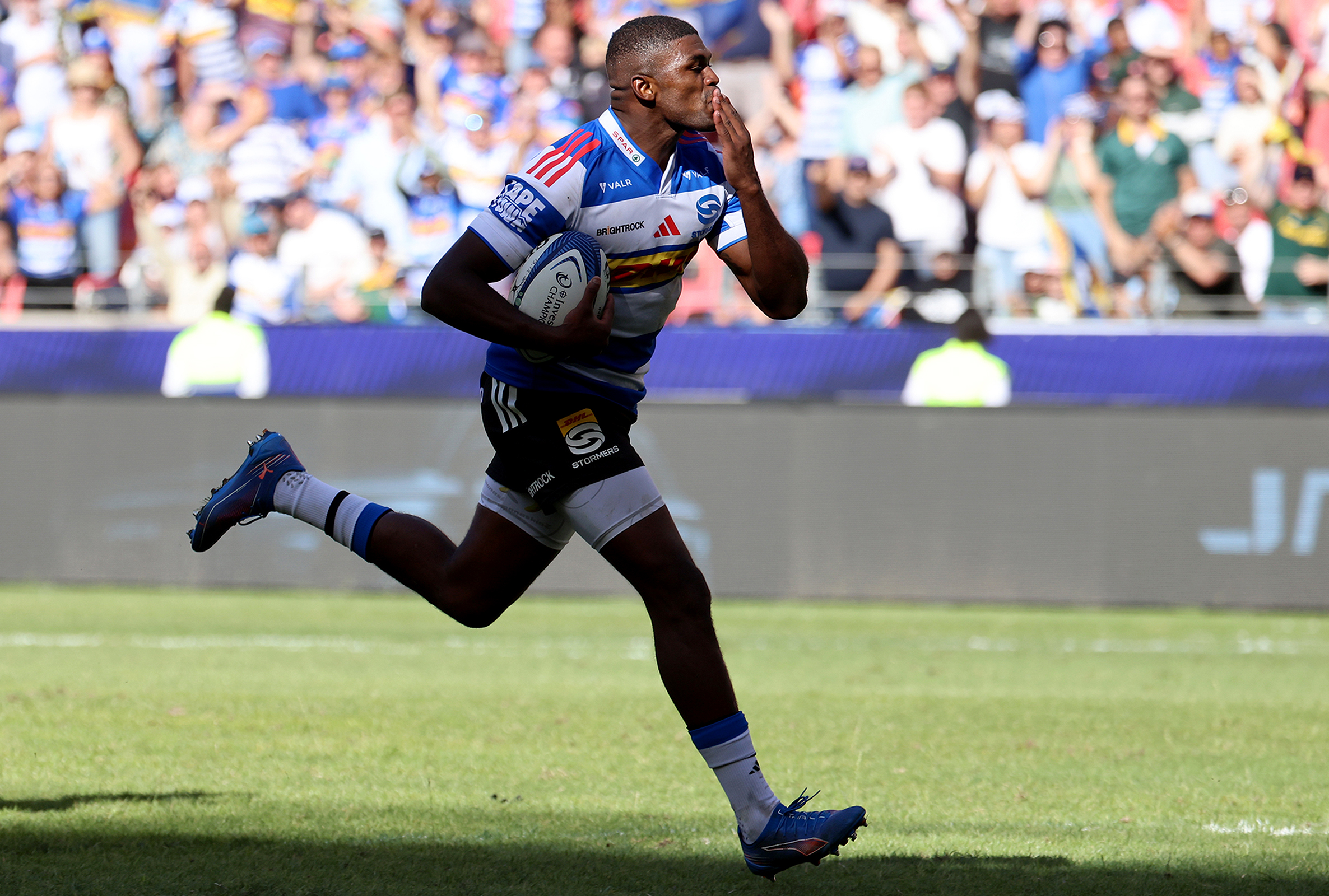
Stormers winger Dylan Maart is among the Investec Champions Cup Round 2 Try of the Round nominees. Give him your support South Africa.
Maart scored a brace of tries in the Stormers’ 42-21 Investec Champions Cup win over La Rochelle in Gqeberha on Saturday.
REPORT: Stormers subdue spirited La Rochelle
At 29, when many players are well-established in their careers, Maart made a life-altering decision to leave his job as a warehouse worker at a bottling plant and betting everything on rugby.
Two years later, that gamble has taken him from the fringes of South African rugby to the Currie Cup podium, the Vodacom URC stage and the bright lights of the Champions Cup with the Stormers.
“I played rugby in primary school, but nothing in high school, for various reasons,” Maart told Rapport. “Things weren’t good at home. There were many nights when there was no food and we went to sleep hungry.”
At just 13, he worked as a taxi guard – opening doors, collecting fares, carrying bags – simply to help put food on the table. It was also the only way he could get to school in Paarl, riding for free because he worked on the taxi.
But Maart never let go of his love for the game.
When his chance finally came, he grabbed it with both hands, winning promotion and silverware with the Boland Cavaliers, becoming a cornerstone of a Griquas side that ended a 55-year Currie Cup drought, and now making his mark in Stormers colours following a loan deal.
The Stormers are two from two in the Investec Champions Cup and have put themselves in a position to host a last 16 home play-off and more home play-offs because of their excellent start.
The Stormers, in 2025/26 are eight wins from eight starts in all competitions, with just two of those wins coming at their home venue, the DHL Stadium in Cape Town.
They play the Lions in their final match of the year in Cape Town at the DHL Stadium on Saturday. It is in the URC in what will be their ninth match of the 2025/26 season.
SUPER SATURDAY FOR STORMERS AND SHARKS
KEO News Wire
In-form Springboks trio star in the Investec Champions Cup

The in-form Springboks trio wearing numbers 9, 10 and 12 of November continued their hot form in Round 2 of the Investec Champions Cup.
Sacha Feinberg-Mngomezulu (Stormers), Andre Esterhuizen (Sharks) and Cobus Reinach (Stormers) were South Africa’s biggest individual contributors. Their match statistics reinforced their contributions.
Bulls No 8 Elrigh Louw, in his comeback month, was comfortably his team’s best performer.
Feinberg-Mngomezulu’s individual statistics against La Rochelle read like a distinction list, with Paul de Villiers and Cobus Reinach producing massive individual returns in the 42-21 Investec Champions Cup win against La Rochelle.
Feinberg-Mngomezulu made the most metres (90), beat the most defenders (7), made the most kicks in play (11) and carried the ball the most (13). Player of the Match De Villiers, who won vital turnovers on his team’s own try line, made the most tackles (16), beat four defenders, the second most among the Stormers, alongside scrum half Cobus Reinach, and made the fifth most running metres (47). He also was made the third most carries (9), one behind second placed Reinach.
The impact of Springboks Reinach and Feinberg-Mngomezulu is emphasised by their individual contributions and collective as a halfback pairing. The duo featured as the biggest contributors in every one of the four primary attacking categories.
De Villiers’s all-round impact, on attack, defensively and at the breakdown speaks to his Investec Player of the Match Award.
SUPER SATURDAY FOR STORMERS AND SHARKS
Sharks inside centre captain Andre Esterhuizen, in his 100th match for the Sharks, made the most tackles for his team (14), the most carries (11), beat the most defenders (5) and made the second most metres (29). His fellow Springboks midfielder beat four defenders, which was the second most for the Sharks.
EVERY PLAYER STATISTIC AND TEAM STATISTIC FROM ROUND 2s 12 MATCHES
Springbok loose-forward Elrigh Louw, in his first start of the season after a lengthy lay-off because of a serious leg injury, was the top performer for the embattled Bulls against the Northampton Saints. The Bulls lost 50-5 but Louw was the the only bright light on a dark night.
Louw, who started at No 8, played for 58 minutes in his third comeback match. He made the most carry metres, 41, the second most tackles (13), which was one less than Marcell Coetzee and he won the most turnovers for the Bulls (2).
KEO News Wire
Stormers and Sharks deliver as Bulls take heavy hit in Investec Champions Cup Round 2
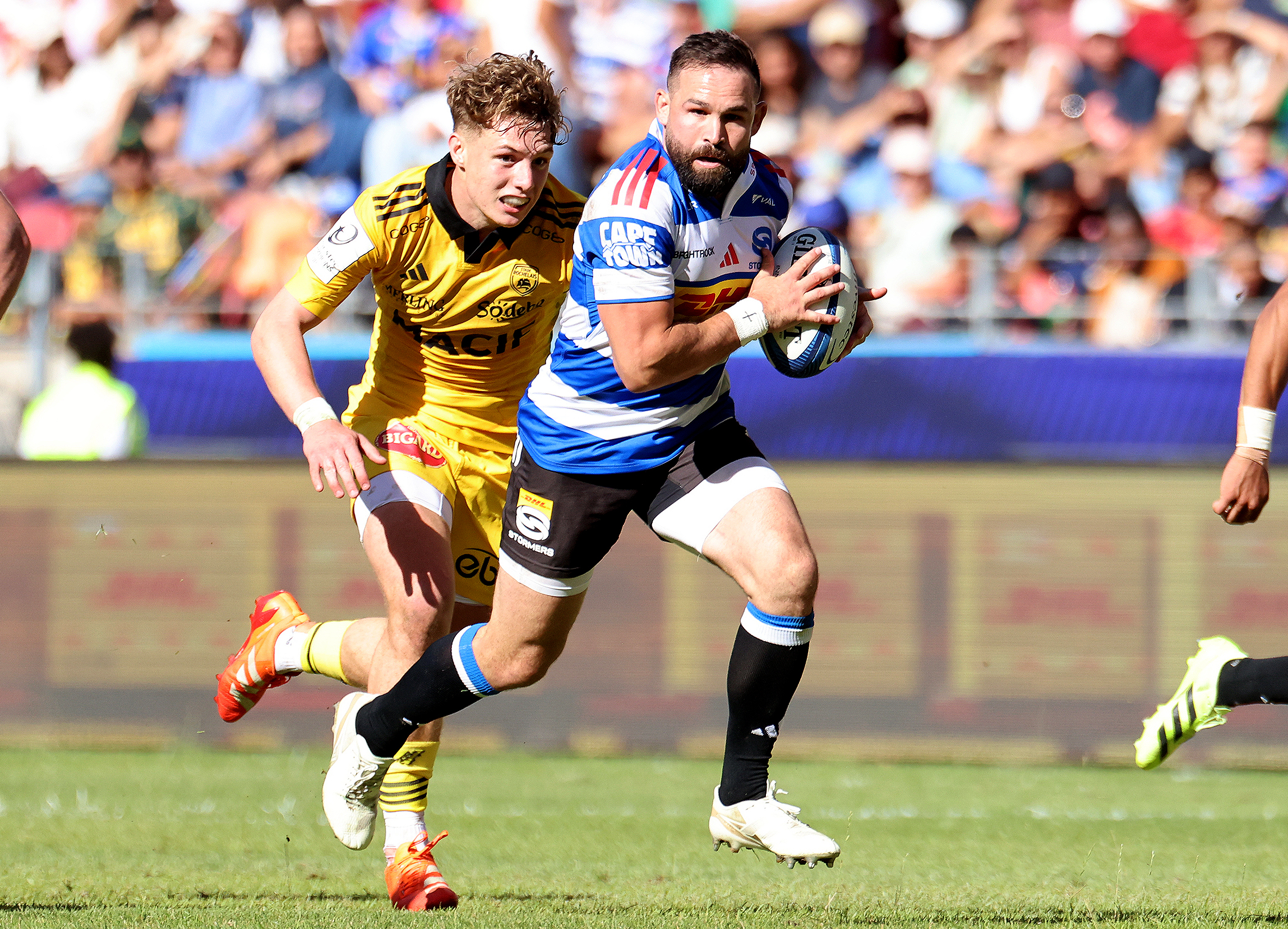
Round 2 of the Investec Champions Cup delivered big results, with South African teams at the heart of the weekend’s action. The Stormers and Sharks both notched morale-boosting wins, while the Bulls endured a punishing afternoon in Northampton.
The Stormers opened Saturday’s fixtures with a commanding 42–21 win over defending champions Stade Rochelais in Cape Town. Physical dominance up front and clinical finishing saw the hosts pull away in the second half to maintain their perfect start to the tournament.
Over in Durban, the Sharks showed resilience to edge Saracens 28–23 in wet conditions at Kings Park. The hosts held off a late surge from the English giants to claim their first win of the campaign.
But it was a difficult outing for the Bulls, who travelled to face Northampton Saints and were outplayed in all areas. The 52–5 defeat was compounded by a hat-trick from Saints winger George Hendy, who now has four tries in the tournament.
South African-born Ernst van Rhyn featured again for Sale Sharks, who ran in five tries in a 35–14 victory over Clermont in France. Sale’s backline sliced through with ease as they claimed a valuable away win.
Elsewhere, Leinster held off a strong challenge from Leicester Tigers on Friday night to win 23–15, while Glasgow Warriors pulled off the shock of the round recovering from 21–0 down to beat Stade Toulousain 28–21.
Bordeaux Bègles racked up 50 points against Scarlets, and Munster turned on the style late to beat Gloucester 31–3.
Sunday’s action saw Harlequins dismantle Bayonne 68–14, Castres blank Edinburgh 33–0, and Toulon edge Bath 45–34 in a high-scoring thriller. Bristol Bears closed out the round with a dominant 61–12 win over Pau.
Investec Champions Cup Round 2 Results
Friday
-
Leicester Tigers 15–23 Leinster Rugby
Saturday
-
DHL Stormers 42–21 Stade Rochelais
-
Hollywoodbets Sharks 28–23 Saracens
-
ASM Clermont Auvergne 14–35 Sale Sharks
-
Union Bordeaux Bègles 50–21 Scarlets
-
Munster Rugby 31–3 Gloucester Rugby
-
Glasgow Warriors 28–21 Stade Toulousain
Sunday
-
Harlequins 68–14 Aviron Bayonnais
-
Castres Olympique 33–0 Edinburgh Rugby
-
RC Toulon 45–34 Bath Rugby
-
Northampton Saints 52–5 Vodacom Bulls
-
Bristol Bears 61–12 Section Paloise
KEO News Wire
Cheetahs, Lions fall short as EPCR Challenge Cup brings late drama
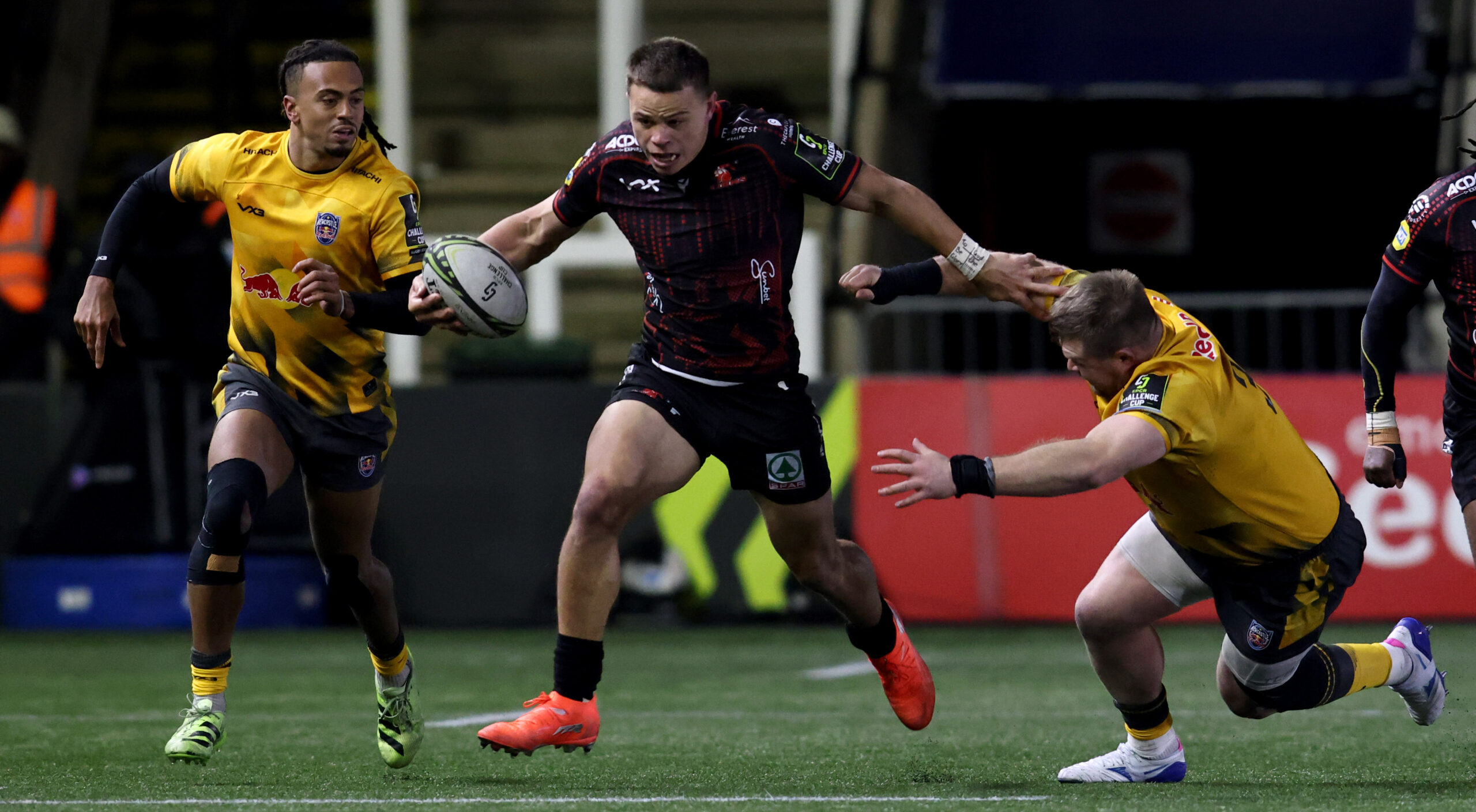
South Africa’s two representatives in the EPCR Challenge Cup both suffered Round 2 defeats on Saturday, as European sides produced a mix of dominance and drama across the competition.
The Cheetahs started brightly in Amsterdam, leading Stade Français at the break, but were overwhelmed in the second half. The French club ran in six tries including a brace for Thibaut Motassi to clinch a convincing 45–22 bonus-point win.
In Newcastle, the Lions looked set to bounce back from their opening loss after an early try from Angelo Davids. But the Red Bulls held firm and struck late, with a 78th-minute Murray McCallum try snatching a 14–10 victory for the hosts.
Elsewhere, Benetton backed up their Round 1 result with a 44–31 home win over USAP, while Ospreys overcame a spirited Montauban side 33–22 despite a second-half wobble.
In Galway, Connacht were ruthless in a 52–0 demolition of Black Lion, with Paul Boyle grabbing a first-half hat-trick. In contrast, Cardiff edged Ulster 29–26 in a thriller, with Callum Sheedy’s late penalty sealing the win after a dramatic fightback from the Welsh side.
Sunday delivered more excitement as Racing 92 salvaged a 31–31 draw with Exeter Chiefs thanks to an 83rd-minute conversion by Geronimo Prisciantelli. Meanwhile, Dragons RFC snapped a year-long losing streak with a 23–21 comeback win over Lyon.
EPCR Challenge Cup Round 2 Results
Saturday:
-
Benetton Rugby 44–31 USAP
-
Toyota Cheetahs 22–45 Stade Français
-
US Montauban 22–33 Ospreys
-
Newcastle Red Bulls 14–10 Lions
-
Connacht Rugby 52–0 Black Lion
-
Cardiff Rugby 29–26 Ulster Rugby
Sunday:
-
Racing 92 31–31 Exeter Chiefs
-
Dragons RFC 23–21 Lyon Olympique
KEO News Wire
Elrigh Louw brings light to another dark day for belittled Bulls

Springbok Elrigh Louw was the light for the Bulls on what was another dark day in the 2025/26 season, writes Mark Keohane.
The Bulls were belittled, more than beaten, by the Northampton Saints on Sunday in the Investec Champions Cup, and what made the afternoon that much more embarrassing for the South Africans is that the Saints were not at their best for the first 50 minutes.
Louw, who played more minutes against the Saints than he has since coming back for a serious injury and nearly a year out of the sport, is growing in confidence and strength. The Springboks No 8 is a class act and he was the one player who looked like an international in a Bulls match 23 that played with little intensity and even less regard for the preciousness of holding onto the ball.
Louw, who started at No 8, played for 58 minutes in his third comeback match. He made the most carry metres, 41, the second most tackles (13), which was one less than Marcell Coetzee and he won the most turnovers for the Bulls (2).
Unfortunately, on this particular afternoon Kade Wolhuter produced probably his worst match of a young professional career. Wolhuter, 24, was a schoolboy star for Paul Roos, Western Province and South Africa’s Youth Teams, but he has battled to transition to professional rugby, having moved from Western Province and the Stormers to the Lions and now the Bulls.
He missed his only two kicks at posts and, as a team and coach killer, he missed three penalty kicks to the touchline. All of these misses were punished by the Saints on the counter-attack. His skill set deserted him with each passing minute and his chip kicks were poor, his passes were ineffective or intercepted and the worse it got, the further back in the pocket he stood.
Springboks two-times World Cup winner and flyhalf Handre Pollard’s presence would have made a difference to the performance but it would not have changed the result.
The Bulls have problems, are devoid of confidence, seem confused as to how to play and most certainly are not showing the desire to prove to new coach Johann Ackerman that the squad should remain the same next season.
Their Investec Champions Cup campaign is over before 2026 has started, having lost both matches in December and conceded 96 points in the process. Their URC campaign is not looking healthy, with three wins in six starts.
The Saints, winners at Pau, are well positioned going into the new year, and they will back themselves to host a home last 16 play-off match.
The Investec Champions Cup, in the play-offs is a representation of the toughest club competition in the world, but the league stages need a revisit, as does the schedule, because too many teams are sending lambs to the slaughter in away games, and then backing big home wins to make the play-offs.
There are six clubs, at best, with proper depth to compete in their domestic competition in parallel to the Investec Champions Cup, and even a club like Saracens found out that to win in South Africa, like in France, you have to send your best squad. They will be hurt by the defeat to the Sharks in Durban.
The Bulls, somehow, trailed 7-5 after 35 minutes and had so many opportunities to be ahead and to put doubt into the home team players and supporters, but the ill-discipline and lack of defensive structure, intensity or mongrel, resulted in a 50-5 defeat.
It got messy in the end and it is going to continue to get messy for the Bulls if they fail to address the fact that they have a serious defensive problem.
READ ALL THE LATEST FROM THE INVESTEC CHAMPIONS CUP
KEO News Wire
SA’s Super Saturday as Stormers & Sharks win big
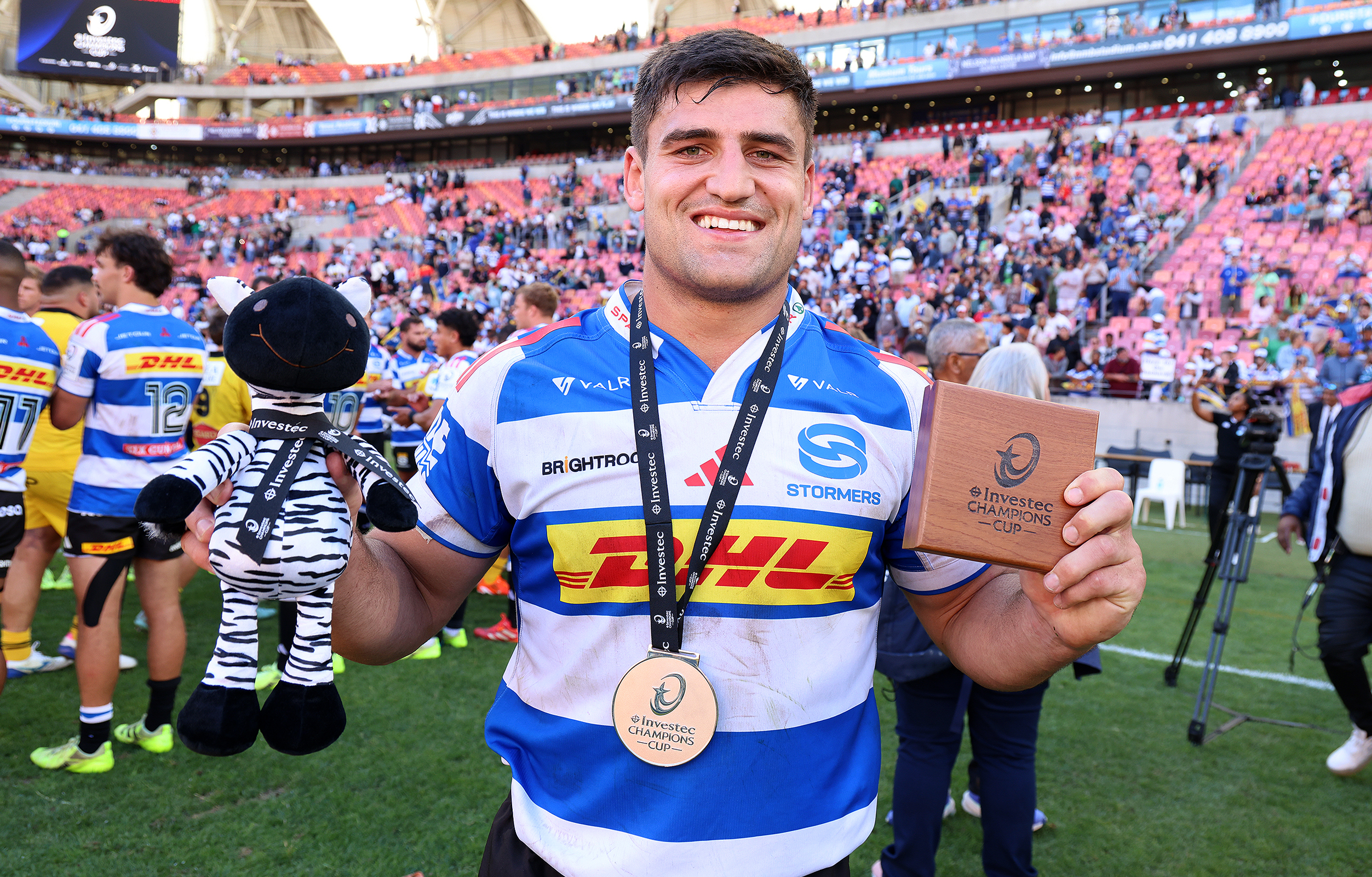
The Investec Champions Cup play-off ambition lives strong for the Stormers and Sharks after contrasting, but equally decisive wins on Saturday, writes Mark Keohane.
The Stormers and Sharks both made a statement to teams from up north. Bring your best squads to the Republic to beat South Africa’s elite. Defending champions Bordeaux recognised this a week ago when they went to Pretoria and downed the Bulls. They picked their strongest available match 23, including 16 internationals.
A lessor squad would not have come back from 33-22 at halftime but the world class squad of Bordeaux won comfortably 46-33.
La Rochelle, a two-time title winner, played kids against the Stormers and got done with more ease than the scoreboard suggests.
The Stormers scored six tries to three and had two disallowed in the first 15 minutes. They could – and should – have been 24-0 up before the 15th minute. They played with pace and width and Sacha Feinberg-Mngomezulu’s line kicking was a lesson in accuracy and control.
Inside of him, Springboks scrum half Cobus Reinach played as if he had spent the past decade at the Stormers. Reinach, on signing for the Stormers from Montpellier, made it clear he was not moving to the Stormers to wind down his career. He was moving to win matches and titles.
The Stormers won 42-21 and felt they should have done better. Their coaches lamented periods of the game, in which they lost shape, structure and the ball.
But they scored at will, when they needed to, and defended with purpose when it was demanded to keep out the youthful La Rochelle set-up.
Flanker Paul de Villiers were brutal over the ball, winning crucial turnovers and the Stormers pack, as a collective, never seemed troubled. De Villiers was named Investec Player of the Match, and Feinberg-Mngomezulu and Reinach were as imposing in their individual brilliance and clutch moments.
La Rochelle’s coaching team spoke of the gains from a young squad, how they felt they matched the Stormers for physicality but were undone by the initial pace at which the Stormers played.
The Stormers captain Salmaan Moerat, when told of this, said it had been noted, especially the view that they had expected more physicality from the Stormers.
The Stormers are two from two in the Investec Champions Cup, with an away win at Bayonne in France a week ago, and now this win at the Nelson Mandela Bay Stadium.
They are also six from six in the Vodacom United Rugby Championship, having not played at their home base in Cape Town since the league’s opening two matches in the last week week of September and first week in October.
They’ve done the next six on the road, in five different countries, with and without their current Springboks.
They play the Lions in the URC on Saturday in Cape Town, but for now the relief was the opening fortnight of the Investec Champions Cup had been safely negotiated and the Stormers sit atop of their Pool, edging Leinster on points difference.
WATCH: STORMERS WIN FOR 8th SUCCESSIVE TIME IN ALL COMPETITIONS
KEO & ZELS CALLED THE STORMERS AND SHARKS INVESTEC CHAMPIONS CUP WINS
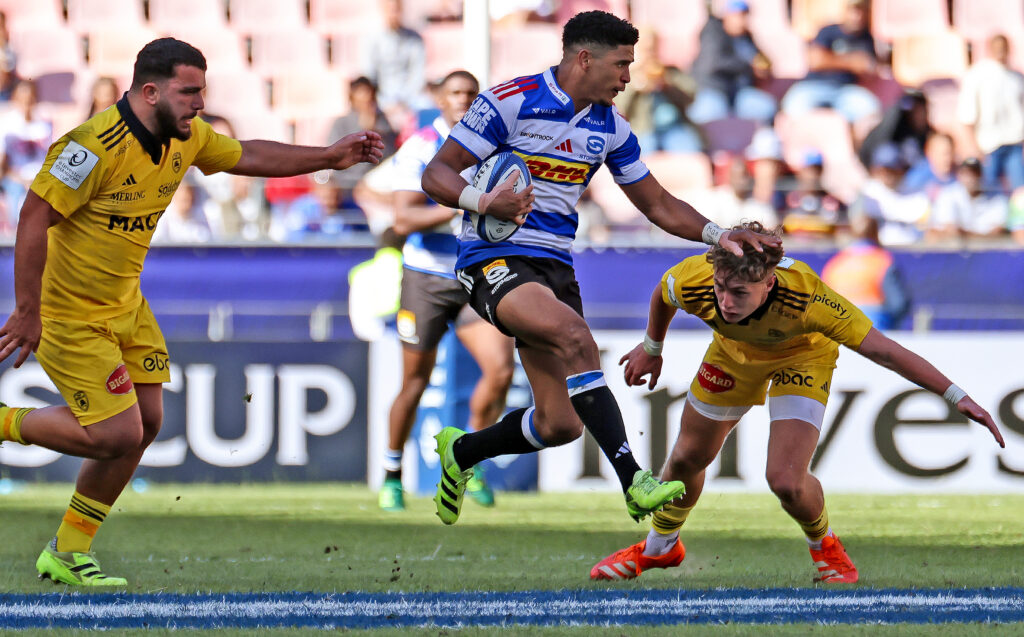
INPHO/Steve Haag Sports
JP Pietersen’s tenure as Sharks coach got reward as the hosts beat Saracens 28-23 in Durban.
The weather conditions were tough, the match was tough, and not easy on the eye, but the Sharks played with desire to get a result after a woeful start to the competition and an equally poor start to the URC.
Saracens rested some of their biggest names in Owen Farrell, Jamie George and Maro Entoje, and the Sharks were the beneficiaries of this marvellous England trio not being in the match 23.
Andre Esterhuizen, at inside centre, played his 100th match for the Sharks and led the team as captain.
Springboks captain Siya Kolisi started and emptied the tank in his 51 minute performance. Kolisi scored the opening try in a match that could have gone either way. Saracens had a chance to draw/win the match with the last play in injury time, but they knocked on a metre from the Sharks try line and the victory belonged to the Sharks.
*In the EPCR Challenge Cup, RedBull Newcastle scored in the 78th minute to beat South Africa’s Lions 14-10 and Stade Francis beat the Cheetahs 45-22 in Amsterdam.
For all the latest on the SA challenge in the Investec Champions Cup, visit SARugbymag
KEO News Wire
SA stars crack Investec Champions Cup Team of the Week
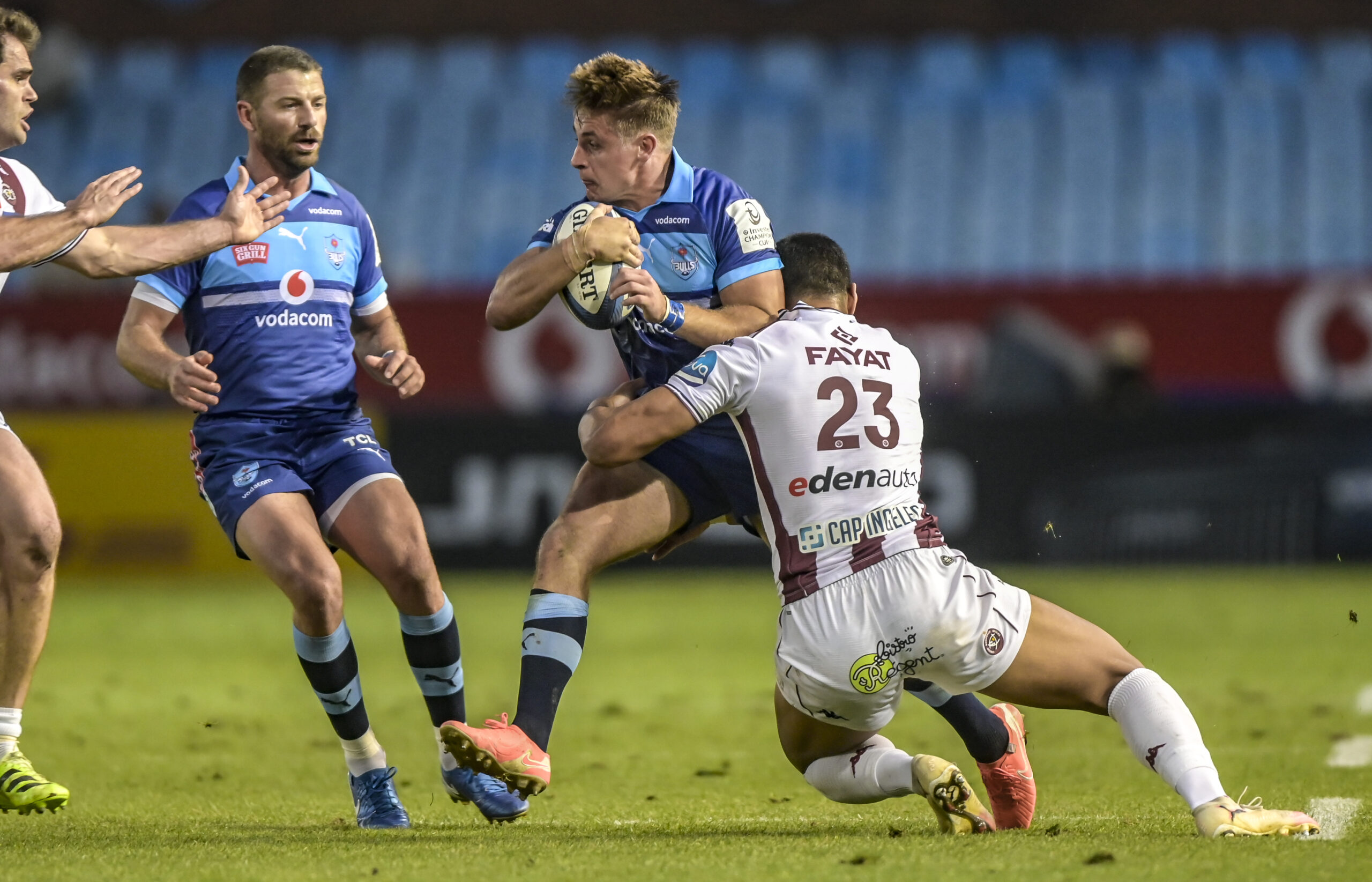
Three players from South African franchises have been included in the Investec Champions Cup Team of the Week following standout performances in Round 1.
Stormers front-rower Ntuthuko Mchunu was rewarded for a powerful display at loosehead, while his teammate Ben-Jason Dixon earned selection at flank after a high work-rate showing against Bayonne.
Sebastian de Klerk, the Vodacom Bulls speedster, claimed the left wing jersey after crossing the tryline in the Bulls’ thrilling clash with Bordeaux.
Also featuring in the XV is Kyle Steyn, the Glasgow Warriors captain, who qualifies via his South African roots and filled the right wing spot after a strong outing against Sale Sharks.
Selections were based on performance data from Oval Insights.
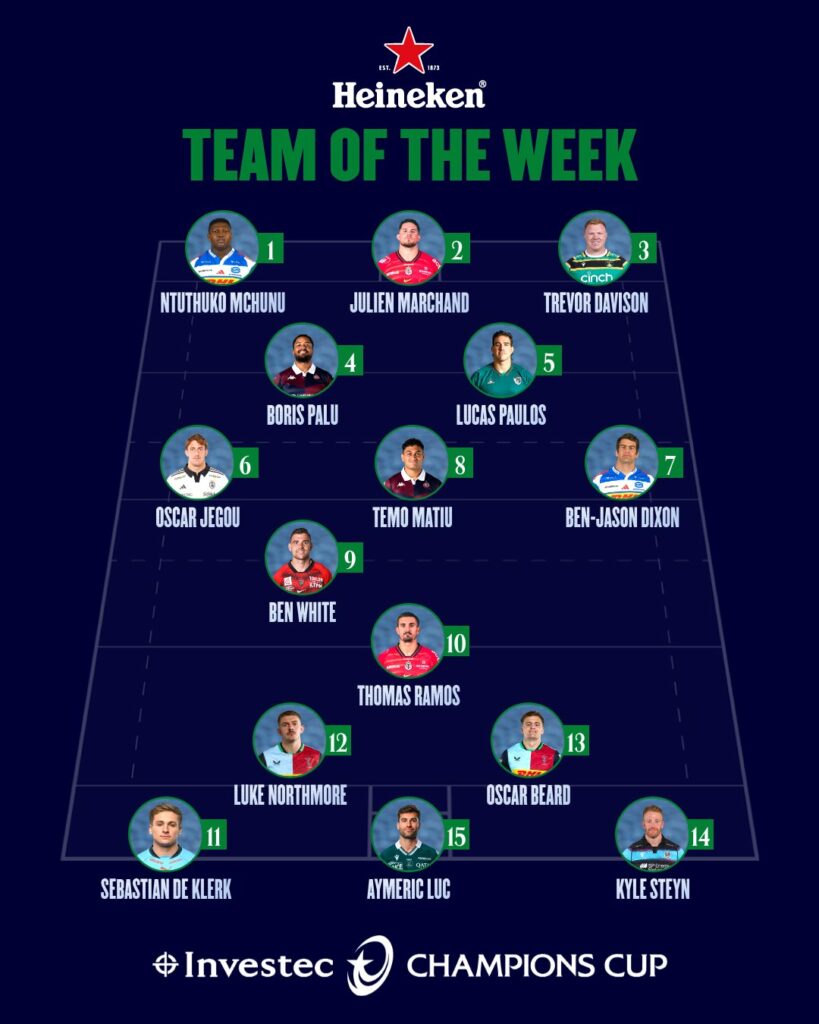
Keo selected his SA Team of the Week, that consist of 8 Stormers and 7 Bulls players. Sadly, no Sharks player made the cut.
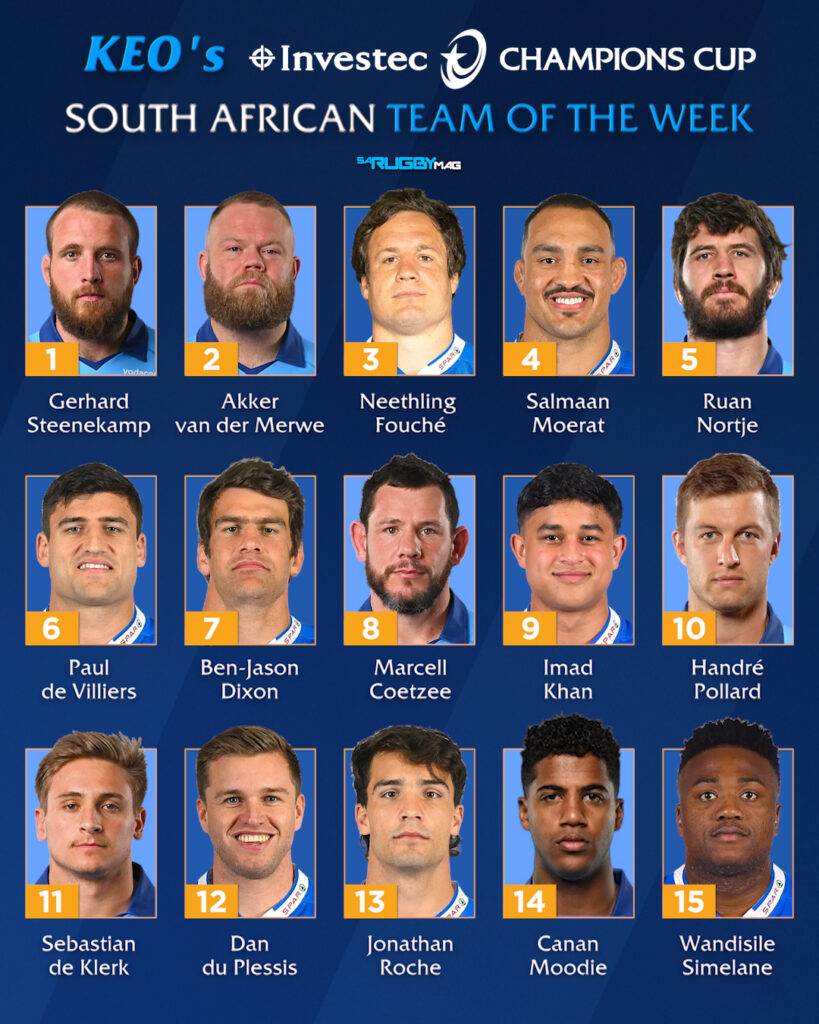
KEO News Wire
Investec Champions Cup running red hot in Round 2
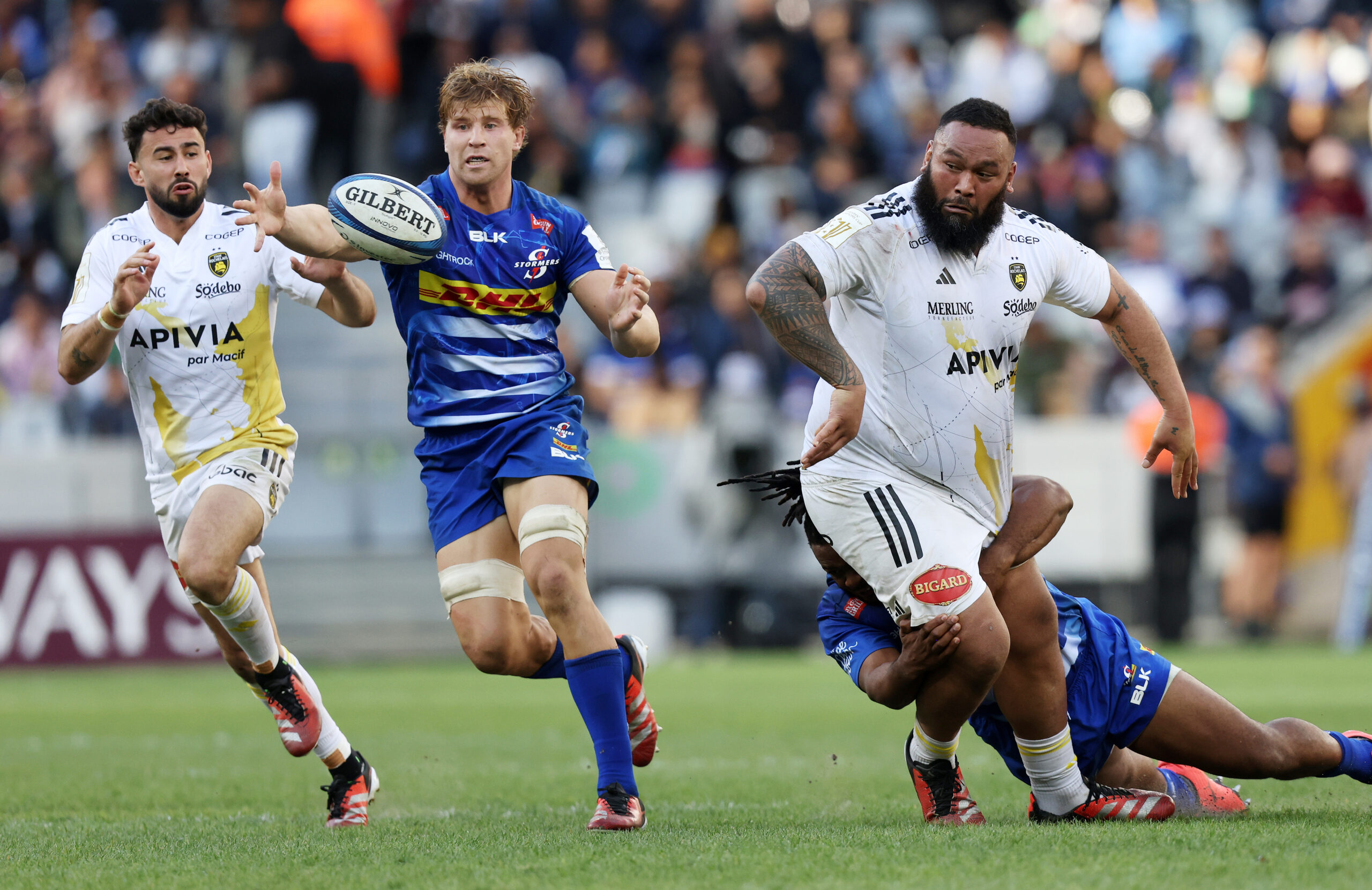
The Stormers and La Rochelle will be the weekend’s headline act in South Africa in Round 2 of the Investec Champions Cup.
English giants Saracens travel to Durban to play the Sharks and the Bulls are away to last season’s beaten finalists, Northampton Saints.
Home wins are non-negotiable for potential title winners and while the Stormers won’t exactly be playing at home in Cape Town, they will be in South Africa for their showdown with French club La Rochelle.
The Stormers won’t play in Cape Town because the stadium is unavailable this weekend, but they will play Leicester’s Tigers at the DHL Stadium in Cape Town in their final Pool match mid-January, 2026.
Stormers vs La Rochelle
Nelson Mandela Bay Stadium
Fresh from an impressive away win over Bayonne, the Stormers return to home soil to face a powerful Rochelle outfit. Flyhalf Clinton Swart led all point-scorers in Round 1 with 16, and the Cape side were excellent at the breakdown, winning more turnovers than any other team (10). Swart also leads the tournament in kick metres with 415.
La Rochelle were equally dominant in their opener, scoring six tries and controlling the maul. Hooker Tolu Latu hit 13/13 lineouts, while Oscar Jegou crossed twice. This is a clash of breakdown steel versus French physicality .
Expect plenty of changes to the match 23s that featured in last weekend’s opening round, where the Stormers and La Rochelle both won.
ROUND 1’s BIG GUNS FIRED BIG SHOTS
Sharks vs Saracens
Hollywoodbets Kings Park
The Sharks will be desperate to respond after leaking eight tries to Toulouse. Despite the loss, they topped the round for offloads (18) and dominant carry contacts (32), with Batho Hlekani and Le-Roux Malan both physical threats. They’ll need to tighten up defensively against a clinical Saracens side who beat Clermont 47–10.
Teenage wing sensation Noah Caluori was sharp in Round 1 with 116 metres gained and seven defenders beaten, while Nick Tompkins delivered five offloads in a typically slick Saracens performance .
Bulls vs Northampton Saints
Franklin’s Gardens
The Bulls showed attacking promise in a five-try effort against Bordeaux but ultimately fell short at home. Defence will be key against a Saints team that won their opener and brings a sharp mix of pace and structure. The Bulls will need more discipline and accuracy to make an impact in Pool 4.
Ernst van Rhyn (Sale Sharks) vs Clermont
Ernst van Rhyn delivered a defensive masterclass in Round 1, making a tournament-high 31 tackles for Sale in their narrow loss to Glasgow. He’ll be key again as the English club faces a Clermont side reeling from a heavy defeat to Saracens .
AFRICA PICKS: WHO CASHED IN ON THE OPENING WEEKEND
Also in Round 2
-
Leicester vs Leicester – Jordan Larmour (171m, 7 defenders beaten) leads a Leinster side that looked sharp in attack.
-
Toulouse vs Glasgow – The French giants ran in eight tries last week. Ange Capuozzo scored a hat-trick.
-
Munster vs Gloucester – Both sides are chasing consistency after mixed Round 1 showings.

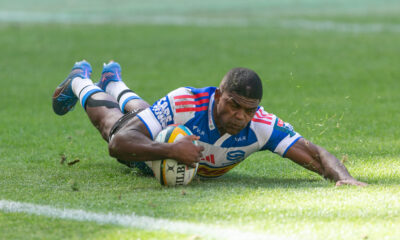

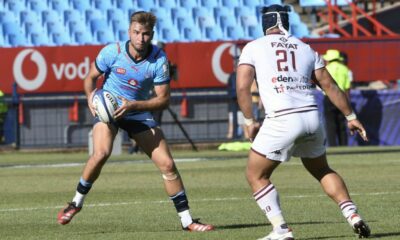









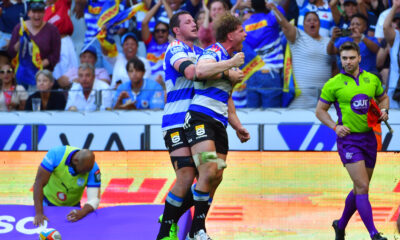



Snow Apk Mail
6th December 2023 at 12:58 pm
God, you’re incredible! I can’t recall ever reading anything like it. What a relief to discover someone who has fresh ideas about this. Your initiative in launching this is truly appreciated. Someone with some creativity is really required on the web, and this website provides that.
Fake Mail
31st December 2023 at 5:24 am
Very well presented. Every quote was awesome and thanks for sharing the content. Keep sharing and keep motivating others.
Fake Temp Mail
1st January 2024 at 1:42 pm
What i do not realize is in fact how you are no longer actually much more wellfavored than you might be right now Youre very intelligent You recognize thus considerably in relation to this topic made me in my view believe it from numerous numerous angles Its like men and women are not fascinated until it is one thing to do with Lady gaga Your own stuffs excellent All the time handle it up
Travis Oconnor
9th January 2024 at 3:42 am
Its like you read my mind! You appear to know a lot about this, like you wrote the book in it or something. I think that you could do with some pics to drive the message home a little bit, but instead of that, this is fantastic blog. An excellent read. I will certainly be back.
Amelie Cronin
13th January 2024 at 10:58 pm
I loved as much as you will receive carried out right here The sketch is attractive your authored material stylish nonetheless you command get got an impatience over that you wish be delivering the following unwell unquestionably come more formerly again since exactly the same nearly a lot often inside case you shield this hike
abonnements iptv smarters player
17th January 2024 at 11:05 pm
Nice blog here! Also your site loads up fast! What host are you using? Can I get your affiliate link to your host? I wish my web site loaded up as quickly as yours lol
walgreens midland mi
23rd January 2024 at 4:28 am
hi!,I like your writing so much! share we be in contact more approximately your article on AOL? I need a specialist in this area to resolve my problem. Maybe that is you! Looking ahead to see you.
James K. W. Owens
29th January 2024 at 2:24 am
Love this appreciation for great content
Jaden Cohen
30th January 2024 at 9:50 am
I love how this blog promotes a healthy and balanced lifestyle It’s a great reminder to take care of our bodies and minds
Fernando Elijah Stefan Valdez
30th January 2024 at 7:15 pm
Your blog is a constant source of wisdom and positivity Thank you for being a ray of light in a sometimes dark world
Miriam Waller
31st January 2024 at 3:38 pm
Your positive energy and enthusiasm radiate through your writing It’s obvious that you are truly passionate about what you do
Noelle Yasmin Delilah Dunlap
2nd February 2024 at 6:10 am
Your writing style is so engaging and easy to follow I find myself reading through each post without even realizing I’ve reached the end
Braxton Campbell
2nd February 2024 at 9:50 pm
Your blog has helped me become a more positive and mindful person I am grateful for the transformative effect your words have had on me
Maximus Yadiel Buckley
4th February 2024 at 1:43 am
It’s not often that we come across content that really resonates with us, but this one is a standout. From the writing to the visuals, everything is simply wonderful.
Sydney Dillon
4th February 2024 at 10:35 pm
Your positivity and enthusiasm are infectious I can’t help but feel uplifted and motivated after reading your posts
Angel W. Macias
6th February 2024 at 7:48 pm
Your passion for this topic shines through in your writing It’s clear that you put a lot of effort and thought into your posts Thank you for sharing your knowledge with us
Shaina Little
7th February 2024 at 1:12 am
is so bad
qweqtt
10th February 2024 at 12:21 pm
I do not even know how I ended up here but I thought this post was great I do not know who you are but certainly youre going to a famous blogger if you are not already Cheers
Healthstay
29th February 2024 at 5:02 pm
This is really interesting, You’re a very skilled blogger. I’ve joined your feed and look forward to seeking more of your magnificent post. Also, I’ve shared your site in my social networks!
STC marketing
15th May 2024 at 11:36 am
“You’re amazing!”
Free classified submission sites 2025
27th January 2025 at 9:08 pm
Your positive energy and enthusiasm radiate through your writing It’s obvious that you are truly passionate about what you do
Free Classified Submission Sites List In India 2025
31st January 2025 at 11:04 pm
Every time I read one of your posts, I come away with something new and interesting to think about. Thanks for consistently putting out such great content!
Car Classifieds India
5th February 2025 at 4:21 pm
This blog is like a virtual mentor, guiding me towards personal and professional growth Thank you for being a source of inspiration
Lavonda Christley
16th December 2025 at 12:42 pm
It’s actually a cool and helpful piece of information. I’m glad that you shared this useful information with us. Please keep us up to date like this. Thanks for sharing.
fdertolmrtokev
19th December 2025 at 10:04 am
It’s laborious to find educated folks on this matter, however you sound like you know what you’re speaking about! Thanks
ayuda TFM arquitectura
30th December 2025 at 10:22 pm
I like the efforts you have put in this, appreciate it for all the great blog posts.
banco multifuncional
30th December 2025 at 11:20 pm
It’s hard to seek out educated people on this matter, but you sound like you recognize what you’re speaking about! Thanks
casas en José Ignacio
31st December 2025 at 1:49 am
Sweet blog! I found it while surfing around on Yahoo News. Do you have any tips on how to get listed in Yahoo News? I’ve been trying for a while but I never seem to get there! Thank you
👅🍆 Dating for sex. Go 📩➡️ yandex.com/poll/43o224okZdReGRb1Q8PXXJ?hs=8f0d829c0088a08238dc0af48c5650ee& Reminder # AJTC4572944 👅🍆
3rd January 2026 at 10:52 pm
4jkr18